Eras Codes
ErasCodes.com
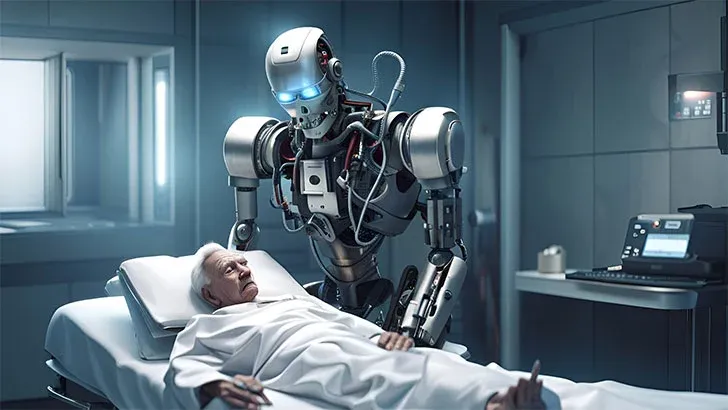
In today's digital age, artificial intelligence (AI) has become a game-changer in various industries, and healthcare is no exception. AI-powered healthcare and medical care websites are revolutionizing the way individuals access and receive medical services. With their advanced capabilities and intelligent algorithms, these technological marvels offer personalized care, enhance diagnostic accuracy, and improve overall healthcare outcomes.
AI has emerged as a transformative force, reshaping the healthcare landscape and empowering individuals to manage their well-being. By leveraging machine learning, data analytics, and natural language processing, AI-powered healthcare websites enable users to access a wide range of medical resources, information, and services with ease. They provide intelligent symptom checkers, virtual consultations, personalized treatment plans, and even predictive analytics to anticipate health issues before they become critical.
Moreover, AI algorithms can process vast amounts of medical data and extract meaningful insights, aiding healthcare professionals in making accurate diagnoses and treatment decisions. This technology has the potential to significantly reduce medical errors, streamline workflows, and improve patient outcomes. Whether it's monitoring chronic conditions, tracking fitness goals, or managing medication, AI-powered healthcare and medical care websites are transforming the way individuals approach their health.
In this article, we will explore a comprehensive list of AI-powered healthcare and medical care websites that cater to individuals seeking innovative solutions for their healthcare needs. Each platform offers a unique set of features and capabilities designed to enhance the user experience and deliver personalized medical care. By harnessing the power of AI, these websites are revolutionizing healthcare delivery, empowering individuals to take charge of their health and well-being.
As we delve into the detailed descriptions of these platforms, you will discover the vast potential of AI in improving healthcare accessibility, efficiency, and quality. From intelligent symptom analysis to remote patient monitoring, these AI-powered solutions are paving the way for a more connected and proactive approach to healthcare. By the end of this article, you will be inspired to explore and utilize these technological advancements, leveraging AI to enhance your healthcare journey.
Join us on this enlightening exploration of AI-powered healthcare and medical care websites and unlock the immense possibilities they hold for individuals seeking improved health outcomes and a better quality of life.
1. Glass AI
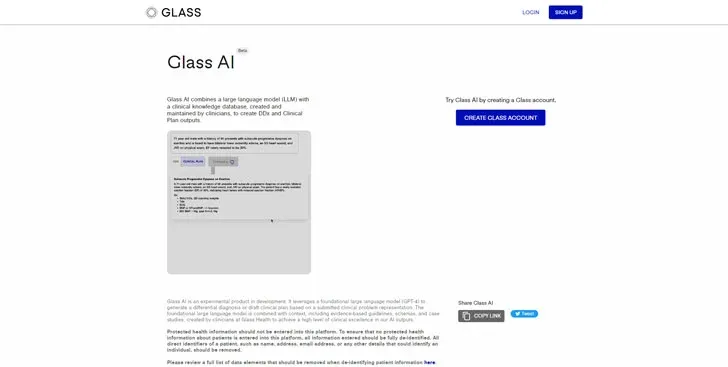
In the realm of AI-powered healthcare and medical care websites, Glass AI stands out as an experimental product developed by Glass Health. This cutting-edge website harnesses the power of a large language model (LLM) trained on an extensive collection of medical text and code. While still in development, Glass AI exhibits immense potential by generating differential diagnoses and drafting clinical plans based on submitted clinical problem representations. By combining the LLM with evidence-based guidelines, schemas, and case studies created by clinicians at Glass Health, this platform aspires to deliver clinical excellence in its outputs. However, it's crucial to note that Glass AI should be supervised and reviewed by healthcare professionals, as it does not aim to replace their judgment.
Features and Capabilities of Glass AI
- Differential Diagnoses and Clinical Planning: Glass AI demonstrates its prowess by generating differential diagnoses and proficiently drafting clinical plans, utilizing the submitted clinical problem representation as a foundation.
- Broad Medical Knowledge Base: With its training on an extensive dataset of medical text and code, Glass AI possesses a vast understanding of diseases and treatments, equipping it with a wide range of knowledge to draw upon.
- Support for Clinical Decision-Making: While Glass AI is designed to support healthcare professionals in their decision-making process, it is important to underscore that it should complement rather than replace their judgment and expertise.
- Informative Platform: The Glass AI website serves as an informative hub, offering comprehensive details about the platform, including its features, benefits, and limitations. It serves as a valuable resource for healthcare professionals looking to incorporate Glass AI into their clinical decision-making workflow.
- User Feedback and Improvement: Glass AI actively seeks feedback from healthcare professionals to enhance its capabilities and overall user experience. The input from users plays a vital role in refining and optimizing the AI model.
- Promoting Awareness: The Glass AI website aims to create awareness of its potential benefits within the healthcare industry. By fostering discussions and collaborations, Glass AI contributes to the advancement of AI-powered healthcare.
- Blog Section for Updates: The Glass AI website includes a dedicated blog section, providing timely news and updates about the platform. This ensures that healthcare professionals stay informed about the latest developments in AI-driven clinical support.
Glass AI emerges as a promising AI-powered healthcare platform, empowering healthcare professionals with advanced clinical support. By leveraging its extensive medical knowledge base, Glass AI assists in generating differential diagnoses and clinical plans, complementing the decision-making process of healthcare professionals. While it is crucial for healthcare professionals to exercise their judgment, Glass AI serves as a valuable tool in the pursuit of clinical excellence. Stay informed and engaged with Glass AI's website to explore the transformative potential of AI in the healthcare industry.
2. Buoy
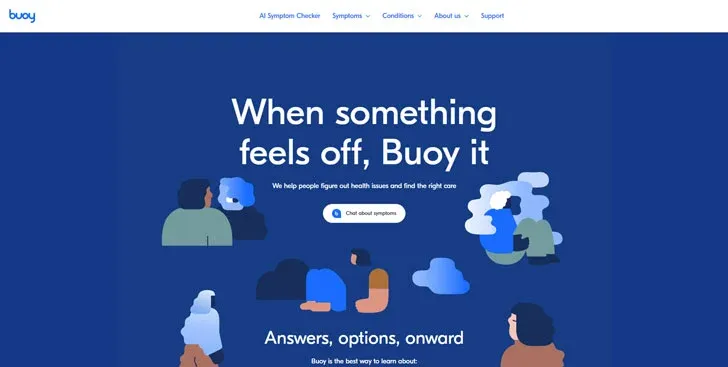
Buoy is a leading AI-powered healthcare website that provides individuals with a range of tools and resources to manage their medical concerns. Developed by a team of doctors and data scientists from the Harvard Innovation Labs, Buoy leverages AI technology to deliver personalized clinical support and assist users in making informed healthcare decisions. With its user-friendly interface and comprehensive features, Buoy aims to empower individuals by offering accurate information and valuable insights into their health.
Features and Capabilities of Buoy
- Symptom Checker: Buoy's AI-driven symptom checker is a standout feature of the platform. By utilizing advanced algorithms, the symptom checker helps users identify possible health conditions based on their reported symptoms. Through a series of intelligent questions, the tool provides a list of potential conditions that match the symptoms, offering users a starting point for further medical evaluation.
- Medication Guide: Buoy provides an extensive medication guide that furnishes users with essential information about common medications. Users can access details such as side effects, interactions, and usage guidelines, enabling them to make well-informed decisions regarding their prescribed medications.
- Health Library: The website's health library serves as a comprehensive resource for users, covering various health topics including diseases, treatments, and prevention strategies. Users can access reliable and up-to-date information to expand their knowledge and take proactive steps towards better health.
- Informative Blog: Buoy maintains an engaging blog featuring articles focused on health and wellness. The blog covers a wide range of topics, from tips for maintaining a healthy lifestyle to insights into emerging medical research and advice on managing specific health conditions. The blog serves as a reliable source of up-to-date information for individuals seeking guidance and inspiration.
Buoy's AI-powered platform offers individuals the convenience of accessing accurate medical information, symptom evaluation, medication guidance, and comprehensive health resources. By combining cutting-edge technology with valuable insights, Buoy empowers users to take control of their health and make informed decisions throughout their healthcare journey.
3. HealthGPT+
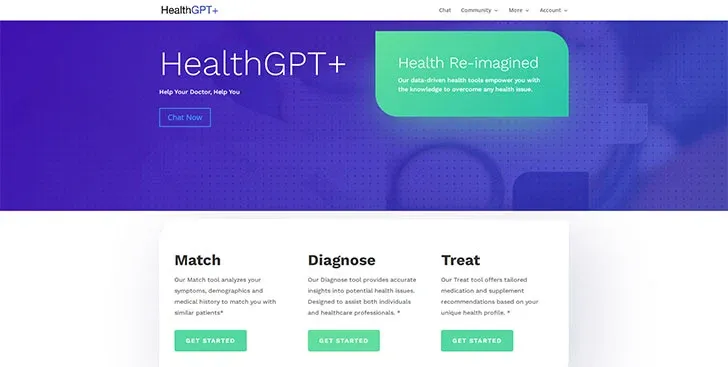
HealthGPT+ is an AI-powered website that provides a variety of tools to enhance individuals' health and wellness. With its chatbot, symptom analysis tool, personalized treatment recommendation tool, and patient matching feature, HealthGPT+ aims to empower users with accurate and convenient AI-driven solutions. The website also includes a shop where users can purchase health-related products.
Features and Capabilities of HealthGPT+
- Chat: Personalized health advice and recommendations are provided through the chatbot feature.
- Diagnose: AI-driven tool that analyzes symptoms and medical history to offer insights into potential health issues.
- Treat: This tool offers tailored medication and supplement recommendations based on users' unique health profiles.
- Match: The patient matching feature connects individuals with similar health profiles for information sharing and support.
HealthGPT+ is an AI-powered healthcare website that offers a range of tools to support individuals in their health and wellness journey. With its chatbot, symptom analysis tool, personalized treatment recommendation tool, and patient matching feature, HealthGPT+ aims to empower users by providing accurate and convenient AI-driven solutions. It is important to note that the accuracy of the tools has not been independently verified, and they should not be used as a substitute for professional medical advice. HealthGPT+ is committed to user privacy and anonymity, and the content and services provided on the website are for informational and educational purposes only. Users are advised to consult with qualified healthcare professionals for accurate diagnosis, treatment plans, and medical guidance.
4. Aidacura

Aidacura is a leading AI-powered healthcare website that focuses on empowering individuals to take charge of their mental well-being. Founded in 2022 by a team of mental health professionals and technologists, Aidacura aims to make mental health care more accessible and affordable. By leveraging the power of artificial intelligence, Aidacura provides a comprehensive mental health toolkit that includes chatbots, mood tracking, goal setting, journaling, meditation, and community support.
Features and Capabilities of Aidacura
- AI-Powered Chatbot: Aidacura's chatbot utilizes natural language processing and machine learning algorithms to deliver personalized mental health advice, coping strategies, and therapist referrals. The chatbot acts as a virtual companion, providing immediate assistance to individuals seeking support and guidance.
- Mood Tracking: Aidacura enables users to track and monitor their emotions over time, allowing them to identify patterns and make informed decisions about their mental health journey. This feature empowers individuals to gain deeper insights into their emotional well-being and take proactive steps towards self-care.
- Goal Setting: With Aidacura, users can set achievable goals for their mental health and track their progress along the way. The platform provides support and encouragement through the chatbot and community, fostering motivation and accountability.
- Journaling: Aidacura offers a secure and confidential space for users to express their thoughts and feelings through journaling. This feature allows individuals to reflect on their experiences, gain clarity, and enhance self-awareness.
- Meditation: Aidacura's meditation tool provides guided meditation sessions to help users relax, reduce stress, and promote overall mental well-being. By incorporating mindfulness practices, individuals can find a sense of calm and balance amidst the challenges they may face.
- Community Support: Aidacura facilitates connections among individuals who are struggling with mental health through its community support forum. Users can engage in discussions, share experiences, and provide support to one another in a safe and empathetic environment.
Aidacura is a remarkable AI-powered healthcare website that empowers individuals to prioritize their mental well-being. With its comprehensive toolkit and features such as the AI-powered chatbot, mood tracking, goal setting, journaling, meditation, and community support, Aidacura offers a holistic approach to mental health care. By making mental health resources easily accessible and confidential, Aidacura breaks down barriers to seeking professional help and encourages individuals to proactively manage their mental well-being. For individuals seeking an AI-powered healthcare solution that combines personalized support, tools for self-reflection, and a supportive community, Aidacura is the ideal choice.
5. Dr.Tail
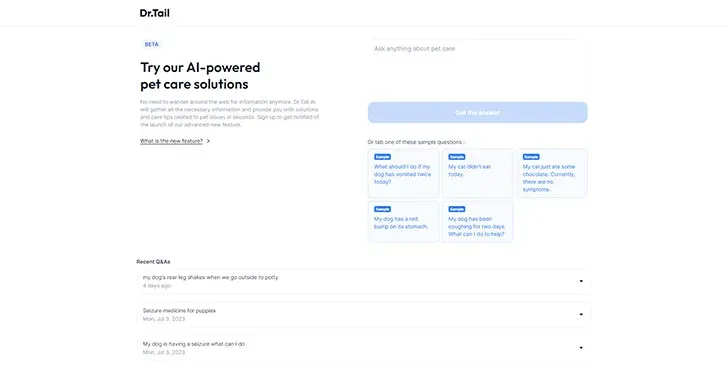
Dr.Tail is an innovative AI-powered healthcare website specifically designed to cater to the needs of pet owners. Founded in 2022 by a team of veterinarians and technologists, Dr.Tail aims to make pet care more accessible and affordable. By leveraging the power of artificial intelligence, Dr.Tail provides a comprehensive suite of tools and resources to assist pet owners in making informed decisions about their pet's health.
Features and Capabilities of Dr.Tail
- AI-Powered Chatbot: Dr.Tail boasts an intelligent chatbot that utilizes a vast dataset of pet health information to deliver personalized advice, treatment plans, and veterinarian referrals. This feature acts as a virtual pet care assistant, providing immediate assistance and guidance to pet owners seeking support.
- Symptom Checker: The website offers a symptom checker tool that helps pet owners identify potential health problems in their furry friends. By inputting specific symptoms, pet owners can receive relevant information and better understand their pet's health condition.
- Treatment Plan: Dr.Tail allows pet owners to create personalized treatment plans for their pets. This feature empowers individuals to take an active role in managing their pet's health, ensuring they receive the care they need.
- Veterinarian Referrals: Finding a trustworthy veterinarian is made easier with Dr.Tail. The website provides a platform for pet owners to search for and connect with veterinarians in their area, ensuring their pets receive professional care and attention.
- Pet Food: Dr.Tail assists pet owners in finding the best food options for their pets' specific needs. With AI-driven recommendations, individuals can make well-informed choices when it comes to their pets' nutrition and overall well-being.
- Pet Supplies: The website also offers a feature that helps pet owners find the best pet supplies for their furry friends. Whether it's toys, accessories, or other necessities, Dr.Tail ensures pet owners can access quality products tailored to their pets' requirements.
Dr.Tail is a leading AI-powered healthcare website that revolutionizes pet care. With its AI-driven chatbot, symptom checker, treatment plans, veterinarian referrals, pet food recommendations, and pet supply assistance, Dr.Tail provides a comprehensive solution for pet owners seeking reliable and accessible pet care resources. By leveraging the power of artificial intelligence, pet owners can track their pet's health, receive personalized advice, connect with veterinarians, and access a judgment-free space to discuss their pet's well-being. For individuals seeking an AI-powered healthcare platform focused on their pets' health, Dr.Tail is an invaluable resource for keeping furry friends happy and healthy.
6. Savor Smart

Savor Smart is a leading AI-powered healthcare website that focuses on providing personalized meal plans and nutrition coaching. With the help of artificial intelligence (AI), Savor Smart creates customized plans based on users' health goals, dietary preferences, and lifestyle habits. The website aims to empower individuals to achieve their health goals and improve their nutrition through personalized guidance and support.
Features and Capabilities of Savor Smart
- Personalized Meal Plans: Savor Smart offers users the ability to answer questions about their health goals, dietary preferences, and lifestyle habits. Based on this information, the website generates customized meal plans tailored to each user's specific needs.
- Nutrition Coaching: Users of Savor Smart receive valuable tips on making healthy choices, progress tracking, and motivation to support their health journey. The platform provides personalized guidance and encouragement to help individuals stay on track and achieve their goals.
- Food Tracker: Savor Smart includes a food tracker feature that allows users to monitor and track their food intake. This tool helps individuals align their eating habits with their health goals and make informed decisions about their nutrition.
- Community Forum: Savor Smart provides a vibrant community forum where users can connect with others who share similar health and nutrition goals. In this forum, users can share tips, seek advice, and find support from a like-minded community.
- Blog: The website features a comprehensive blog section with articles covering various health and nutrition topics. Users can access valuable resources, expert insights, and practical tips to enhance their understanding of nutrition and make informed choices.
Savor Smart stands out as a premier AI-powered healthcare website, offering personalized meal plans and nutrition coaching to individuals seeking to improve their overall health and well-being. With its AI-driven algorithms, users can receive customized meal plans aligned with their health goals, dietary preferences, and lifestyle habits. The additional features of nutrition coaching, food tracking, a community forum, and informative blog articles make Savor Smart a holistic platform for individuals to transform their nutrition habits. By utilizing the power of AI, Savor Smart empowers individuals to achieve their health goals, save time and money, and find support and inspiration from a community of like-minded individuals. For those looking for a comprehensive and AI-powered solution to improve their nutrition, Savor Smart is the ideal choice.
7. MediSearch
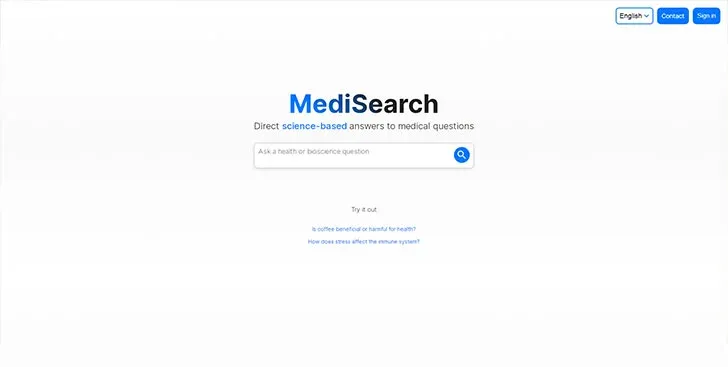
MediSearch is a prominent AI-powered healthcare website that provides individuals with reliable medical information and personalized health insights. Founded in 2021 by a team of experienced healthcare professionals and technologists, MediSearch aims to empower individuals to take control of their own health by offering access to a comprehensive range of medical information, including articles, research papers, patient reviews, treatment options, and symptom checkers. By harnessing the power of artificial intelligence, MediSearch enables users to make informed decisions about their health and well-being.
Features and Capabilities of MediSearch
- Medical Articles and Research Papers: MediSearch offers a vast collection of medical articles and research papers from reputable sources, such as peer-reviewed journals and healthcare organizations. Users can access valuable information on various medical topics and stay updated with the latest advancements in healthcare.
- Patient Reviews and Experiences: The platform provides users with insights into other patients' experiences and reviews related to specific conditions or treatments. This feature allows individuals to gain a better understanding of various medical scenarios and learn from real-life experiences.
- Treatment Options and Side Effects: MediSearch provides information on different treatment options available for specific conditions, including potential side effects. This empowers users to make well-informed decisions about their treatment plans in consultation with healthcare professionals.
- Symptom Checkers and Self-Assessment Tools: MediSearch offers user-friendly symptom checkers and self-assessment tools. Individuals can input their symptoms or assess their health status, gaining valuable insights and potentially identifying potential health concerns that may require further attention.
- Communication with Healthcare Professionals: MediSearch facilitates secure messaging and virtual consultations with trusted healthcare professionals. This feature allows users to seek advice, clarify doubts, and engage in meaningful discussions with medical experts, enhancing the overall healthcare experience.
MediSearch stands out as a leading AI-powered healthcare platform, providing reliable medical information, personalized health insights, and seamless communication with healthcare professionals. With its extensive collection of medical articles, patient reviews, treatment information, symptom checkers, and communication tools, MediSearch empowers individuals to make informed decisions about their health and well-being. By leveraging artificial intelligence, MediSearch ensures users have access to accurate and trustworthy medical information, enabling them to take control of their health journey. For individuals seeking a comprehensive and AI-driven healthcare resource, MediSearch is a valuable platform to enhance their understanding, engage with healthcare professionals, and make informed choices for their well-being.
8. Woebot Health
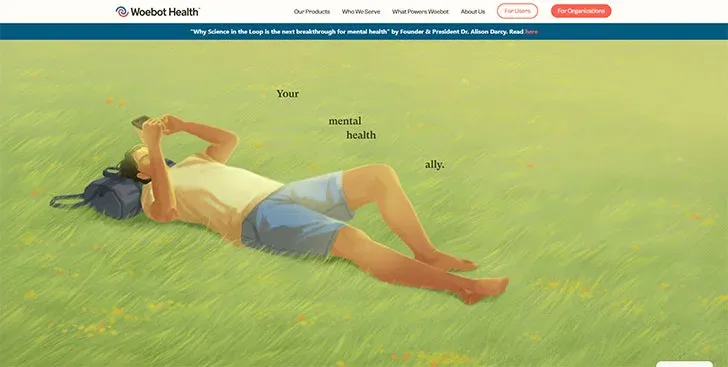
Woebot Health is an innovative AI-powered healthcare website that focuses on providing personalized mental health support to individuals. Using advanced technology and cognitive behavioral therapy (CBT) principles, Woebot Health offers a user-friendly chatbot interface that assists users in managing their mental well-being effectively. With its commitment to accessibility, Woebot Health aims to empower individuals by offering free and convenient mental health interventions right at their fingertips.
Features and Capabilities of Woebot Health
- Personalized Advice: Woebot Health employs AI algorithms to learn about each individual's specific needs and tailors its advice and support accordingly. This personalized approach ensures that users receive relevant and effective recommendations for their unique situations.
- Conversational AI: By utilizing conversation techniques rooted in CBT, the chatbot engages users in meaningful discussions to identify and challenge negative thoughts. It helps users develop healthy coping mechanisms and build positive habits for managing their mental health effectively.
- Daily Check-ins: Woebot Health prompts users to perform daily self-check-ins, enabling them to track their progress and stay engaged in their mental health journey. This daily practice encourages users to reflect on their emotions, achievements, and areas for improvement.
- Progress Tracking: The chatbot diligently monitors users' progress over time, providing a visual representation of their achievements. This tracking feature allows individuals to witness their growth and development, fostering a sense of motivation and empowerment.
- Community Support: Woebot Health fosters a supportive environment by offering a community forum where users can connect, share experiences, and find solace in knowing they are not alone. The community support further strengthens the effectiveness of the platform in promoting mental well-being.
Woebot Health stands out as an exceptional AI-powered healthcare platform, leveraging the power of technology to provide accessible mental health support for individuals. Its combination of sophisticated conversational AI, personalized advice, daily check-ins, progress tracking, and community support creates a comprehensive solution that empowers users to actively manage their mental well-being. With Woebot Health, individuals can experience a personalized and transformative mental health journey, all conveniently accessible through their preferred devices.
9. GymGenie
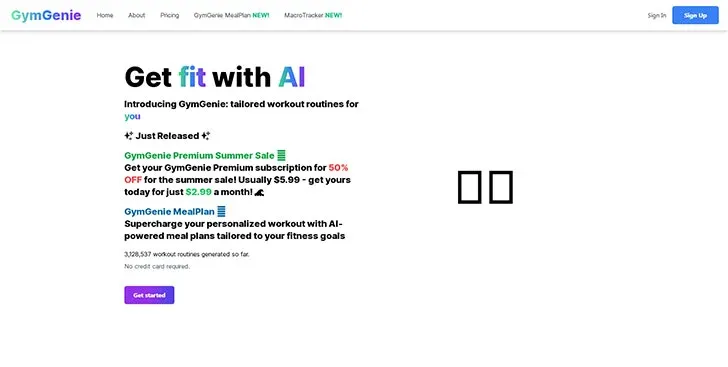
GymGenie is an AI-powered healthcare website that caters to individuals seeking convenient ways to find and book gym classes. With its user-friendly interface and comprehensive features, GymGenie streamlines the process of discovering and reserving fitness classes. Whether you're a fitness enthusiast or a beginner looking to embark on a healthy lifestyle, GymGenie offers a free service that assists users in finding the perfect gym class based on location, time availability, and preferred type of workout.
Features and Capabilities of GymGenie
- Personalized Recommendations: GymGenie harnesses the power of AI to analyze users' search history and preferences, delivering personalized class recommendations tailored to their specific fitness goals and interests.
- Reviews: Users can access and contribute to a vast database of reviews on GymGenie, allowing them to make informed decisions when selecting a gym class. Real user feedback helps individuals gauge the quality, atmosphere, and suitability of each class.
- Price Comparison: GymGenie simplifies the process of finding the best deal by comparing prices from various gyms. This feature ensures that users can make cost-effective choices without compromising on the quality of their fitness experience.
- One-Click Booking: With GymGenie's one-click booking feature, users can reserve their desired gym classes effortlessly. This streamlined process eliminates the hassle of manual registration, making it convenient for individuals to secure their spot in a class quickly.
GymGenie stands out as a user-friendly and efficient AI-powered platform designed to enhance the gym class booking experience. By offering personalized recommendations, user reviews, price comparisons, and convenient one-click booking, GymGenie empowers individuals to make well-informed decisions and take proactive steps towards achieving their fitness goals. Whether you're a fitness enthusiast looking to explore new classes or a beginner seeking guidance, GymGenie simplifies the process of finding and booking the right gym class for you. Experience the ease and convenience that GymGenie provides as you embark on your fitness journey.
10. Saam
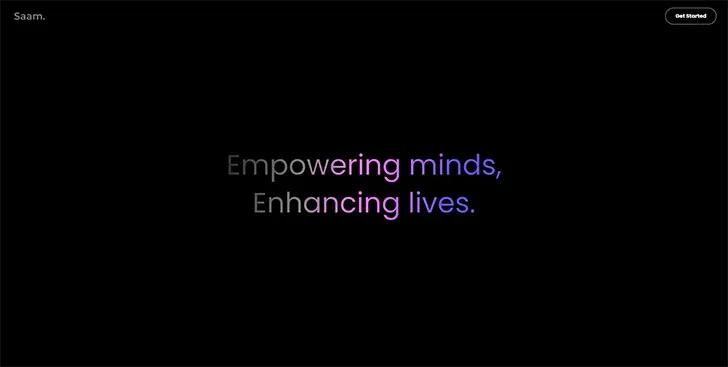
Saam is an AI-powered healthcare website that serves as the landing page for a mental health chatbot designed to provide personalized advice and support. With its user-friendly interface and focus on individual needs, Saam aims to enhance mental well-being by offering tailored guidance and resources. The website acts as an introduction to Saam, allowing users to sign up, access additional information through a blog and FAQ section, and contact the Saam team for inquiries and feedback.
Features and Capabilities of Saam
- Personalized Advice: Saam utilizes advanced AI algorithms to learn about users' individual needs and tailors its advice accordingly, providing personalized recommendations for managing mental health effectively.
- Conversational AI: Saam employs conversation techniques rooted in cognitive behavioral therapy (CBT) to help users challenge negative thoughts, develop coping mechanisms, and build healthy habits through meaningful and supportive conversations.
- Daily Check-ins: Saam prompts users to engage in daily self-check-ins, fostering a consistent practice of reflection and progress tracking. This feature encourages users to stay on track with their mental health goals and celebrate their achievements.
- Progress Tracking: Saam diligently tracks users' progress over time, allowing them to monitor their personal growth and celebrate milestones. This visual representation of progress serves as motivation and encouragement on their mental health journey.
- Community Support: Saam provides a dedicated community forum where users can connect, share experiences, and find support. This supportive environment promotes a sense of belonging and offers a space for individuals to engage with others facing similar challenges.
Saam stands as an exceptional AI-powered healthcare platform, offering personalized mental health support through its innovative chatbot interface. By combining personalized advice, conversational AI, daily check-ins, progress tracking, and community support, Saam empowers individuals to actively manage their mental well-being. With its availability on WhatsApp and its commitment to accessibility, Saam ensures that anyone, regardless of their location or insurance status, can benefit from its services. Embark on a transformative mental health journey with Saam and experience the power of personalized support right at your fingertips.
11. Medical Chat

Medical Chat is an exceptional AI-powered healthcare solution offered by Chat-Data, dedicated to revolutionizing the way healthcare professionals access medical information. Designed to cater to individuals seeking reliable and instant medical answers and clinic plans, Medical Chat stands out as a user-friendly and comprehensive platform. With its powerful AI capabilities, it equips healthcare professionals with accurate information and efficient clinic management tools.
Features and Capabilities of Medical Chat
- Instant Medical Answers: Medical Chat utilizes cutting-edge AI algorithms to deliver rapid responses to a wide range of medical questions. From symptoms and diagnoses to treatment options, users can rely on the chatbot's intelligent algorithms for accurate and timely information.
- Clinic Plan Generation: The platform excels in generating comprehensive clinic plans based on patient symptoms. By incorporating differential diagnosis, patient education, and medication recommendations, Medical Chat assists healthcare professionals in formulating tailored treatment strategies.
- Clinic Plan Management: With Medical Chat, healthcare professionals can save, edit, and share clinic plans effortlessly. The platform offers seamless integration with user workflows, allowing for efficient collaboration and improved patient care.
- Cited Sources: Medical Chat's commitment to accuracy and transparency is evident through its provision of cited sources for all answers. Users can access these sources to delve deeper into medical topics and stay up-to-date with the latest research.
Medical Chat is a game-changing AI-powered healthcare tool that empowers healthcare professionals worldwide. By leveraging its instant medical answers, clinic plan generation, and comprehensive management capabilities, it revolutionizes the way healthcare is delivered. With its user-friendly interface and accurate information, Medical Chat enhances patient care and supports healthcare professionals in making informed decisions. Embrace the power of AI with Medical Chat for a more efficient and effective healthcare journey.
12. Dilseheal
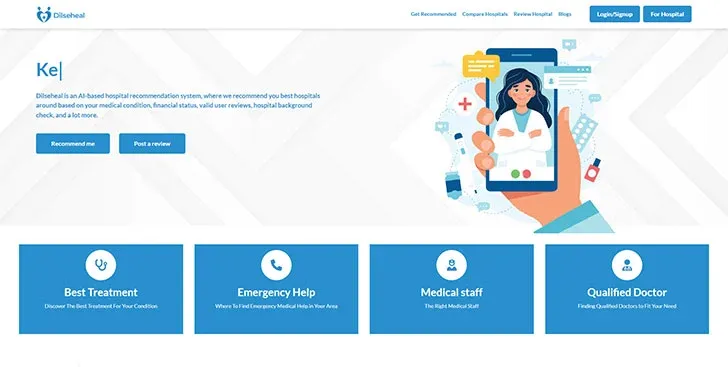
Dilseheal is an innovative AI-powered healthcare platform developed by Chat-Data aimed at assisting individuals in making informed decisions about hospitals. By leveraging advanced artificial intelligence algorithms, Dilseheal offers a comprehensive hospital recommendation system that considers multiple factors, including the user's medical condition, financial status, valid user reviews, and hospital background checks. This user-friendly platform empowers individuals to find the best hospitals for their treatment needs.
Features and Capabilities of Dilseheal
- AI-Based Hospital Recommendation System: Dilseheal utilizes sophisticated AI algorithms to provide users with personalized hospital recommendations based on their specific requirements, ensuring optimal healthcare choices.
- Information about Hospitals: The platform offers detailed information about hospitals located in close proximity to the user. This includes essential details such as location, contact information, services offered, and patient reviews, enabling individuals to make well-informed decisions.
- Health Issue Tracking: Dilseheal facilitates the tracking of health issues through vaccination and monitoring records. Users can conveniently manage their healthcare journey by maintaining comprehensive records within the platform.
- Medical Record Creation and Collaboration: The platform allows users to create, edit, and share medical records, fostering controlled collaboration between doctors and patients. This enhances communication and facilitates coordinated care.
Dilseheal emerges as a comprehensive AI-powered healthcare platform that empowers individuals to make informed decisions regarding their healthcare choices. By leveraging its AI-based hospital recommendation system, detailed hospital information, health issue tracking, and medical record creation capabilities, Dilseheal enhances the user experience and promotes effective healthcare management. Although still under development, Dilseheal showcases immense potential to revolutionize the way individuals navigate the healthcare landscape. Stay tuned for this promising platform that aims to simplify healthcare decision-making and improve patient outcomes.
13. NYLA
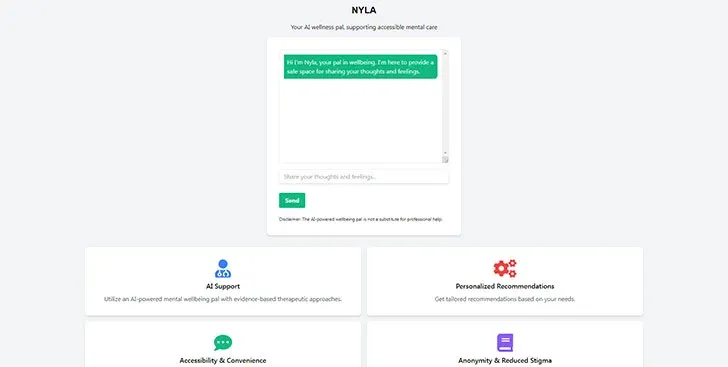
NYLA is a groundbreaking AI-powered web app developed by Chat-Data dedicated to helping individuals manage their mental health effectively. As an empathetic and personalized wellness pal, NYLA offers a safe and confidential space for users to chat, providing evidence-based therapeutic support. With its user-centric approach, NYLA aims to improve mental wellbeing and promote self-care.
Features and Capabilities of NYLA
- Safe and Confidential Chat Space: NYLA provides users with a secure environment to engage in confidential conversations, allowing them to freely express their thoughts and emotions without judgment.
- AI-Powered Support: Leveraging the power of artificial intelligence, NYLA offers empathetic and personalized responses tailored to each individual's needs. Users can rely on NYLA for non-judgmental and supportive interactions.
- Rating System for Continuous Improvement: NYLA encourages users to rate its assistance, facilitating ongoing refinement of the AI model and ensuring a continuously improving support system.
NYLA emerges as a powerful AI-powered wellness pal, empowering individuals to manage their mental health proactively. By offering a safe and confidential space, personalized recommendations, and AI-driven support, NYLA provides convenient access to mental wellness support anytime, anywhere. While NYLA is still under development, it holds immense potential to reduce stigma and promote mental wellbeing. Remember, NYLA is not a substitute for professional help, but it serves as a valuable tool to supplement personal growth and self-care efforts. Embrace the power of NYLA to embark on a journey of enhanced mental wellbeing.
14. Lotus Therapist
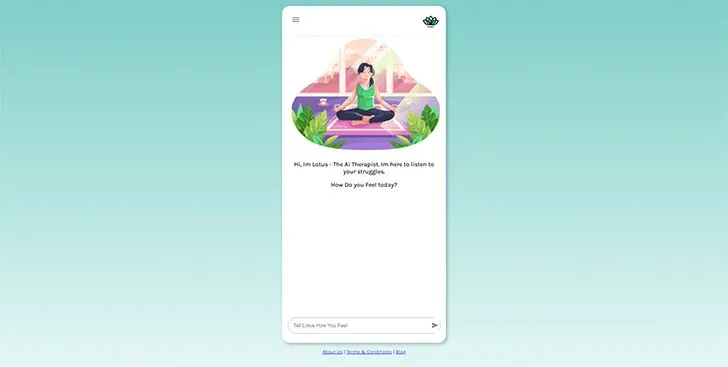
Lotus Therapist is a comprehensive website dedicated to providing individuals with information and resources about holistic psychotherapy and counseling services. Led by experienced therapist Laura, Lotus Therapist aims to be a trusted resource for those seeking holistic approaches to mental health and offers a range of services tailored to individual needs.
Features and Capabilities of Lotus Therapist
- Individual Therapy: The Lotus Therapist offers personalized one-on-one therapy sessions designed to address specific mental health concerns.
- Couples Therapy: Specialized therapy sessions are available for couples, providing guidance and support to improve their relationships.
- Family Therapy: Lotus Therapist offers therapy services for families dealing with various challenges, fostering open communication and resolution.
- Group Therapy: The website provides group therapy sessions for individuals facing similar struggles, offering a supportive environment for shared experiences.
Lotus Therapist, led by therapist Laura with over 10 years of experience, stands as a valuable resource for those interested in holistic psychotherapy and counseling. With its focus on individual, couples, family, and group therapy, Lotus Therapist offers tailored support for various aspects of mental health. By providing informative articles, blog posts, and contact information, Lotus Therapist strives to empower individuals on their mental health journeys. Take advantage of Lotus Therapist's expertise and embrace a holistic approach to enhance your well-being.
15. MindMateGPT

MindMateGPT is an exceptional AI-powered website that offers personalized mental health support for individuals seeking assistance with their well-being. With its advanced chatbot powered by GPT-3, developed by OpenAI, MindMateGPT aims to empower users to identify and manage their mental health challenges while improving their overall well-being.
Features and Capabilities of MindMateGPT
- Personalized Support: MindMateGPT's chatbot provides tailored assistance based on the unique needs and challenges of each individual, ensuring a personalized experience throughout their mental health journey.
- Identification and Management of Mental Health Challenges: Through its AI capabilities, the chatbot helps users recognize and address various mental health challenges by offering valuable information, coping mechanisms, and connections to relevant resources.
- Enhanced Well-being: MindMateGPT goes beyond basic support by providing users with the tools and motivation needed to enhance their overall well-being, leading to a more fulfilling and balanced life.
MindMateGPT stands out as a reliable AI-powered healthcare website designed to assist individuals seeking mental health support. While it does not replace the role of licensed therapists, MindMateGPT's chatbot offers personalized assistance, identification of mental health challenges, and guidance for improving well-being. Users can benefit from the convenience and accessibility of the website while being reminded of the importance of seeking professional help when needed. MindMateGPT effectively combines technology and mental health support to empower individuals on their journey towards better mental well-being.
16. Skinive
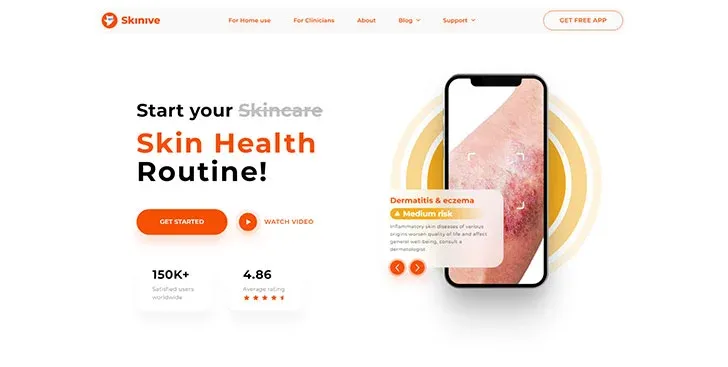
Skinive is an innovative website that offers individuals an AI-powered skin analysis tool, revolutionizing the way patients can detect dangerous skin diseases. By utilizing advanced AI technology and a smartphone camera, Skinive provides users with a comprehensive analysis of their skin condition, helping them identify potential issues in a timely manner.
Features and Capabilities of Skinive
- AI Skin Analysis: Skinive leverages cutting-edge AI technology to analyze the health of the skin and provide users with a detailed and accurate skin condition analysis.
- Patient Triage: The platform assists users in identifying the most appropriate specialty doctor based on their clinical condition, ensuring they receive the right medical attention for their specific needs.
- Skin Condition Tracking: Skinive allows individuals to track changes in their skin condition over time, empowering them to monitor treatment progress and make informed decisions about their skincare routine.
- Personalized Recommendations: Users receive personalized recommendations for skincare products and treatments based on their unique skin condition, enhancing their ability to take proactive measures for optimal skin health.
Skinive stands as a remarkable AI-powered healthcare website, providing individuals with an advanced skin analysis tool to detect potentially dangerous skin diseases promptly. Through AI skin analysis, patient triage, skin condition tracking, and personalized recommendations, users can proactively manage their skin health. It is crucial to note that Skinive should not be seen as a substitute for professional medical advice, and individuals should consult a healthcare provider if they have concerns about their skin's health. By embracing the power of AI, Skinive empowers individuals to prioritize their skin health and take proactive measures towards maintaining healthy, radiant skin.
17. Avey
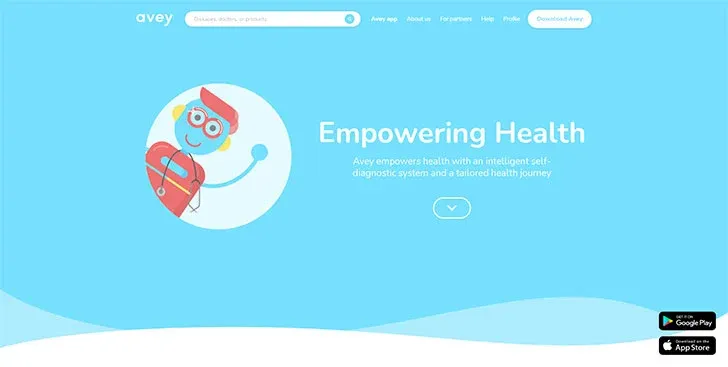
Avey is an exceptional AI-powered medical diagnostic tool designed to empower individuals to self-diagnose their symptoms conveniently. Using a proprietary AI algorithm and an advanced inference engine, Avey asks users a series of questions about their symptoms to generate a comprehensive list of potential diagnoses along with relevant information.
Features and Capabilities of Avey
- Self-Diagnosis: Avey facilitates users in self-diagnosis through a user-friendly question-and-answer process, providing a convenient and accessible healthcare solution.
- Information about Diagnoses: Avey offers detailed information about each potential diagnosis, including comprehensive insights into symptoms, causes, treatments, and prognosis, empowering users to make informed decisions about their health.
- Personalized Recommendations: Avey provides personalized recommendations for further testing or treatment based on users' responses, ensuring tailored guidance and support for managing their health.
- Community Forum: Avey fosters a sense of community by offering a platform where users can connect, share experiences, and seek support from others facing similar health challenges.
Avey stands out as an exceptional AI-powered healthcare website, offering individuals a user-friendly self-diagnostic tool to assess their symptoms conveniently. With its comprehensive self-diagnosis process, provision of detailed diagnosis information, personalized recommendations, and supportive community forum, Avey empowers users to take control of their health journey. It is important to note that Avey is not a substitute for professional medical advice, and users should consult healthcare professionals for accurate diagnoses and guidance. By harnessing the power of AI, Avey revolutionizes healthcare accessibility, allowing individuals to make informed decisions about their well-being.
18. SOMA
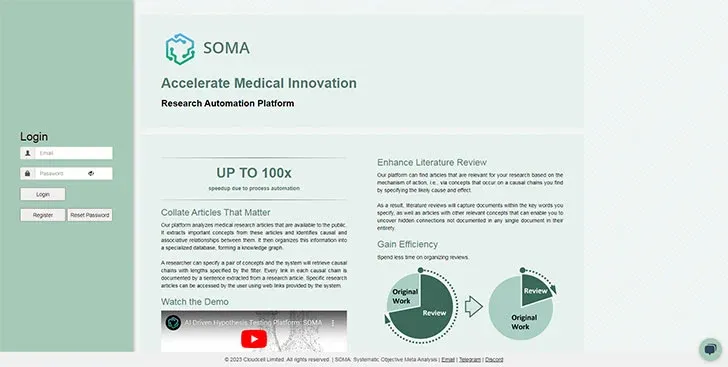
SOMA (Accelerate Medical Innovation) is an advanced research automation platform powered by artificial intelligence. Designed to revolutionize the medical research process, SOMA focuses on analyzing publicly available medical research articles to extract key concepts and identify causal and associative relationships between them. By organizing this information into a specialized knowledge graph, SOMA empowers researchers with quick access to valuable insights, enhancing their ability to drive medical innovation.
Features and Capabilities of SOMA
- Concept Analysis: SOMA analyzes medical research articles to extract important concepts and identify causal and associative relationships between them. This enables researchers to uncover hidden connections and gain a deeper understanding of the research landscape.
- Causal Chain Retrieval: Researchers can input specific pairs of concepts and retrieve relevant causal chains of customizable lengths. Each link in the causal chain is supported by a sentence extracted from a research article, with web links provided for easy access to the specific articles. This feature facilitates root-cause analysis and hypothesis testing in the field of life sciences.
- Enhanced Literature Reviews: SOMA goes beyond simple keyword matching by finding articles relevant to the researcher's specified cause-and-effect relationships based on the mechanism of action. By leveraging this capability, researchers can uncover relevant literature and develop a comprehensive understanding of their research topics.
- Time-saving Automation: SOMA aims to save users up to 80% of the time typically spent on document pre-processing. By automating the analysis of previously published research, researchers can focus more on their own research endeavors, building upon existing knowledge, and driving medical innovation forward.
SOMA, an AI-driven research automation platform, empowers researchers in the medical field to accelerate their innovation and discovery processes. With its capabilities in analyzing and extracting insights from medical research articles, identifying causal and associative relationships, creating a knowledge graph, retrieving relevant articles, and enhancing literature reviews, SOMA saves researchers time while providing valuable insights for their research efforts. By utilizing SOMA, researchers can unlock new possibilities, advance medical knowledge, and contribute to improved healthcare outcomes.
Conclusion
The rise of AI-powered healthcare and medical care websites has ushered in a new era of personalized and accessible healthcare for individuals. The impact of these technological advancements on the healthcare industry is immense, revolutionizing the way we approach medical care and empowering individuals to take control of their well-being.
By harnessing the power of AI, these platforms offer a wide range of benefits to users. They provide accurate symptom analysis, personalized treatment recommendations, and virtual consultations that eliminate the barriers of time and distance. AI algorithms process vast amounts of medical data, enabling healthcare professionals to make informed decisions and deliver precise diagnoses. With remote patient monitoring, individuals can effortlessly track their health conditions and receive timely interventions when necessary.
The convenience and efficiency of AI-powered healthcare and medical care websites cannot be overstated. They save time, reduce unnecessary visits to healthcare facilities, and allow individuals to access medical resources and services from the comfort of their own homes. Moreover, the predictive capabilities of AI help identify potential health risks, enabling proactive interventions and preventive measures.
As we witness the remarkable advancements in AI technology, it is crucial for individuals to embrace and explore these innovative solutions for their healthcare needs. By utilizing AI-powered platforms, individuals can experience improved health outcomes, enhanced convenience, and a higher quality of care. These tools empower users to become active participants in their own healthcare journey, fostering a sense of control and confidence.
In the ever-evolving landscape of healthcare, AI-powered websites have the potential to transform the way we receive medical care. They bridge gaps in healthcare accessibility, improve diagnostic accuracy, and optimize treatment plans. As individuals, it is essential to stay informed and embrace these technological advancements to unlock the benefits they offer.
The future of healthcare lies in the synergy between human expertise and AI-driven technologies. Embrace the opportunities presented by AI-powered healthcare and medical care websites and embark on a journey towards better health and well-being. Explore these platforms, leverage their capabilities, and take charge of your healthcare with confidence and empowerment. The future of personalized, accessible, and AI-driven healthcare is here – it's time to embrace it.
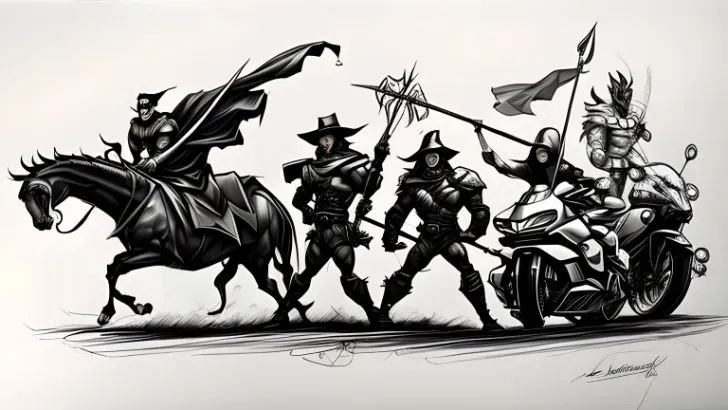
Pencil sketch, cartoon characters, characters introduction sketch, five main characters on scene, action adventure cartoon, super power characters, --ar 3:2
"Write a Text to Image Prompt to Generate a Perfect Image with an AI" is a process of using pre-trained AI models to generate images from text prompts. These AIs have been trained on large datasets of images and text, and have learned to generate images that match text descriptions.
By providing a detailed and accurate text prompt, individuals can use pre-trained AIs to generate high-quality images that meet their specific requirements. This process can be useful for a wide range of applications, including design, art, and visualization.
The key to generating an image using this process is to provide a text prompt that accurately describes the image you want to generate. This may involve describing the objects, colors, textures, and layout of the image in detail, and may require knowledge of the specific pre-trained AI you are using.
Overall, using pre-trained AI models to generate images from text prompts is an exciting and innovative way to create high-quality images that meet specific requirements. With a little practice and experimentation, anyone can learn to write effective text prompts and generate perfect images with AI.
1. Choosing a Pre-Trained AI Model
Choosing a pre-trained AI is an important step in writing a text-to-image prompt to generate a perfect image with AI. There are several AIs available that can generate images from text prompts, each with its own strengths and limitations.
Here are some factors to consider when choosing a pre-trained AI model.
Quality of the Generated Images
One of the most important factors to consider when choosing an AI is the quality of the generated images. You should review examples of images generated by the AI to ensure that they meet your requirements and are of high quality.
Capability to Handle your Specific Task
Different AIs may have different capabilities when it comes to handling specific tasks or types of images. For example, some AIs may be better suited for generating realistic images of objects, while others may be better suited for generating abstract or surreal images.
Ease of use
The ease of use of the AI is also an important factor to consider. Some AIs may have a user-friendly interface that makes it easy to input text prompts and generate images, while others may require more technical expertise to use.
Availability and Cost
Finally, you should consider the availability and cost of the AI. Some AIs may be available for free or at a low cost, while others may be more expensive or require a subscription.
By considering these factors and reviewing the available AIs, you can choose the AI that best meets your requirements and is most suitable for your specific task.
2. Familiarizing yourself with the AI's Capabilities
Familiarizing yourself with the AI's capabilities is an important step when using pre-trained AIs to generate images from text prompts. Each AI has its own set of capabilities and limitations, which can affect the quality of the generated images and the types of prompts that the AI can effectively handle.
Here are some ways to familiarize yourself with the capabilities of the pre-trained AI you have chosen.
Review Examples
One of the best ways to get a sense of what the AI is capable of is to review examples of images generated by the AI. This can help you understand the types of images that the AI can generate and the level of detail and realism that it can achieve.
Read Documentation
The documentation for the AI can provide valuable information about its capabilities, as well as tips for optimizing your prompts to get the best results. You should take the time to read through the documentation and familiarize yourself with the AI's features and limitations.
Experiment with Different Prompts
To get a better sense of the types of prompts that the AI can effectively handle, you should experiment with different prompts and review the resulting images. This can help you understand how specific words and phrases affect the generated images and help you refine your prompts to get better results.
Seek out online Resources
Finally, there are many online resources available that can help you familiarize yourself with the capabilities of AIs. For example, online forums and communities may offer tips and advice for working with specific AIs, while tutorials and guides can provide step-by-step instructions for generating images from text prompts.
By taking the time to familiarize yourself with the capabilities of the AI you have chosen, you can optimize your prompts and generate high-quality images that meet your specific requirements.
A testing prompt a beautiful {nationality} girl, off shoulder white top, face and shoulders in photo, looking at the viewer, portrait shot, ultra detail, sharp focus, in a studio, studio background, studio lighting, professional photographic, 16k (generated multiple images replacing the {nationality} with Afghan, African, American, Brazilian, Chinese, Indian, Indonesian, Iranian, Japanese , Mexican, Russian, and Sri Lankan)
 |
 |
 |
 |
 |
 |
 |
 |
 |
 |
 |
 |












3. Creating a Text Prompt
Creating a text prompt is a critical step in generating an image with AI using pre-trained models. The text prompt is essentially a written description of the image you want the AI to generate. Here are some tips on creating an effective text prompt.
Be Specific
When creating a text prompt, it is essential to be as specific as possible. The more specific your prompt is, the more likely it is for the AI to generate an image that meets your requirements. For example, instead of asking for a "sunset", you could ask for a "colorful, tropical sunset over the ocean with palm trees in the foreground".
Use Descriptive Language
Use descriptive language to convey the image you want to generate. This can include using specific colors, textures, shapes, and sizes to paint a picture of the image in the AI's mind. This can help the AI better understand your prompt and generate a more accurate image.
Consider Context
When creating a text prompt, it is important to consider the context in which the image will be used. For example, if the image is to be used in a marketing campaign, the prompt should be tailored to the target audience and the brand's messaging.
Avoid Ambiguity
Avoid using language that is open to interpretation or could be interpreted in multiple ways. This can lead to an image that does not meet your requirements. Be clear and concise in your language to ensure that the AI generates the image you want.
Experiment with Different Prompts
Experiment with different prompts to see which ones generate the best results. Try varying the language, level of specificity, and context to see which prompts lead to the most accurate and high-quality images.
By creating an effective text prompt, you can help the AI generate an image that meets your requirements and is of the highest possible quality.
4. Formatting the Text Prompt
Formatting the text prompt is an important step in generating a perfect image with an AI using pre-trained models. Proper formatting can help ensure that the AI understands your prompt correctly and generates an image that meets your requirements.
Here are some tips on formatting your text prompt.
Use Natural Language
When formatting your text prompt, it is important to use natural language. This means writing the prompt as you would speak it, using complete sentences and proper grammar. This can help the AI better understand your prompt and generate a more accurate image.
Use Specific Keywords
Use specific keywords in your prompt to help the AI understand the key elements of the image you want to generate. For example, if you want the AI to generate an image of a red apple, use the words "red" and "apple" in your prompt.
Use Punctuation
Use punctuation to help break up your prompt into logical sections. This can make it easier for the AI to understand the different elements of the image you want to generate.
Use Capitalization
Use capitalization to emphasize specific words in your prompt. This can help the AI to better understand the key elements of the image you want to generate.
Avoid using Abbreviations
Avoid using abbreviations or acronyms in your prompt, as the AI may not understand them. Instead, use the full word or phrase to ensure that the AI understands your prompt correctly.
Keep it Simple
Keep your prompt simple and straightforward. Avoid using overly complicated language or syntax that may confuse the AI.
By properly formatting your text prompt, you can help the AI generate an image that meets your requirements and is of the highest possible quality.
5. Submitting the Text Prompt
Submitting the text prompt is the final step in generating an image with an AI using pre-trained models. Once you have chosen a pre-trained A, familiarized yourself with its capabilities, created a text prompt, and formatted it correctly, it is time to submit the prompt and generate the image. Here are some tips on submitting your text prompt.
Follow the AI's Instructions
Different AIs may have different instructions for submitting a text prompt. Make sure to carefully read the instructions provided by the AI before submitting your prompt.
Double-check your Prompt
Before submitting your prompt, double-check it for errors or inconsistencies. Make sure that it is clear and easy to understand, and that it accurately conveys the image you want the AI to generate.
Submit the Prompt
Once you are satisfied with your prompt, submit it to the AI as instructed. This may involve pasting the prompt into a text box or uploading a text file.
Wait for the Image to Generate
After submitting your prompt, you will need to wait for the AI to generate the image. The amount of time this takes can vary depending on the complexity of your prompt and the capabilities of the AI.
Evaluate the Generated Image
Once the AI has generated the image, evaluate it to determine whether it meets your requirements. If it does not, you may need to revise your prompt and resubmit it.
By following these tips and submitting your text prompt correctly, you can help ensure that the AI generates a image that meets your requirements and is of the highest possible quality.
6. Reviewing the Generated Image
Reviewing the generated image is an important step in generating an image with an AI using pre-trained models. Here are some steps on how to review the generated image.
Compare it to your Text Prompt
Start by comparing the generated image to the text prompt you submitted. Make sure that the image accurately reflects the elements of the prompt and meets your requirements.
Check for Quality
Look closely at the image to check for quality issues such as blurriness, pixelation, or distortion. Make sure that the image is clear and high-quality.
Check for Accuracy
Check that the generated image accurately reflects the key elements of the text prompt. For example, if the prompt was for a red apple, make sure that the generated image is indeed an image of a red apple.
Check for Realism
Determine if the generated image looks realistic or if there are any obvious signs that it was generated by an AI. Look for details such as lighting, shadows, and texture to help determine how realistic the image is.
Check for Creativity
Determine if the generated image is creative and original. Consider whether the image meets your expectations and whether it provides a fresh perspective on the elements in your prompt.
Adjust and Repeat
If the generated image does not meet your requirements, consider adjusting your text prompt and resubmitting it to the AI. Repeat the process until you are satisfied with the generated image.
By reviewing the generated image carefully and considering these factors, you can ensure that the AI has generated an image that meets your requirements and is of high quality.
7. Conclusion
In conclusion, generating a perfect image with an AI using pre-trained models involves several important steps, including choosing the right model, familiarizing yourself with its capabilities, creating a text prompt, formatting the prompt correctly, submitting it to the model, and reviewing the generated image. By following these steps, you can generate high-quality, realistic, and creative images that accurately reflect the elements of your text prompt. It is important to note that each AI may have its own specific requirements and limitations, so it is essential to research and understand the model you choose to use. With practice and experience, you can develop the skills to create effective prompts and generate high-quality images using pre-trained AI models.
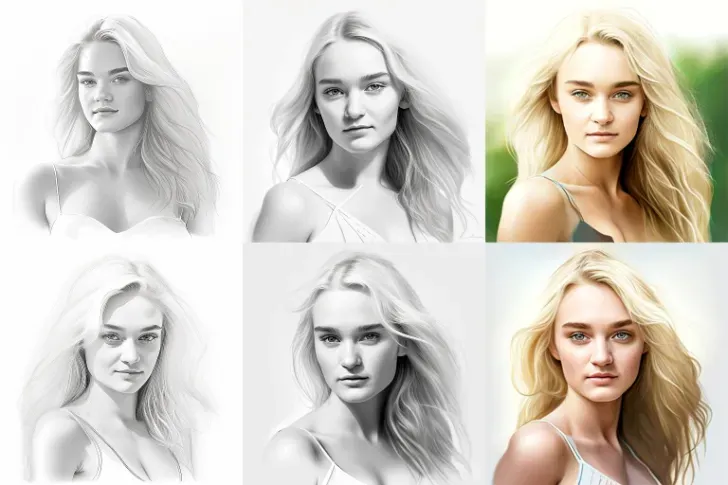
Image prompts are written or visual instructions that guide an AI model to generate an image. These prompts are often in the form of text, sketches, images, or data-driven instructions. By using image prompts, creators can generate unique images that align with their specific needs or preferences.
Image prompts are becoming increasingly important as AI models improve their ability to generate high-quality and realistic images. With image prompts, creators can quickly generate a large number of images without having to manually design each one. This can be particularly useful for tasks such as design, advertising, and content creation.
In addition to their practical applications, image prompts have also been used in artistic contexts. Many artists and designers are experimenting with using AI generated images to create new forms of digital art. This has led to the emergence of a new genre of art that explores the intersection of AI and creativity.
Overall, image prompts have many important applications in both practical and artistic contexts. By leveraging the power of AI, creators can generate high-quality, unique images that align with their specific needs or preferences.
1. Types of image prompts
Types of image prompts refer to different methods or approaches that can be used to inspire or guide artists in creating artwork. An image prompt is essentially a starting point or idea that an artist can use as inspiration for their work. There are several different types of image prompts that can be used, each with their own advantages and potential drawbacks. These types of prompts can include text prompts, sketches, images or photos, and data-driven prompts. By using different types of image prompts, artists can explore different techniques and styles and expand their creative abilities.
Text prompts
Text prompts are image prompts that are based solely on textual descriptions. These prompts typically describe a scene or scenario using words, and then ask the artist to create an image that reflects that description. For example, a text prompt might describe a pencil sketch of a girl looking at the viewer, and ask the artist to create an image that captures this scene.
A text prompt:The result, generated by an AI

Also text prompts can be very open-ended and allow the artist a lot of creative freedom to interpret the prompt in their own way.
Sketches prompts
Sketch prompts are image prompts that provide a rough sketch or outline of an image and then ask the artist to complete the drawing. These types of prompts are often used in art classes or drawing exercises and can help artists improve their skills by providing them with a starting point for their drawings. Sketch prompts can vary in complexity, from simple outlines to more detailed sketches with shading and textures.
Images or photos prompts
Image prompts are image prompts that provide a pre-existing image or photo as a starting point for the artist. These prompts can be used in a variety of ways, from asking the artist to recreate the image in their own style to asking them to use the image as inspiration for a new artwork.
| artist asked to colorize the photo as it is | The result, colorize photo by an AI |

|

|
Image prompts can be a great way to spark creativity and encourage artists to think outside the box.
Data-driven prompts
Data-driven prompts are image prompts that are generated based on data or statistical analysis. These prompts often involve using computer algorithms or machine learning models to analyze a large dataset and then generate an image that reflects the patterns or trends found in the data. Data-driven prompts can be a powerful tool for generating creative prompts that are based on real-world data and reflect the patterns and trends found in that data.
2. Factors to consider when writing image prompts
Factors to consider when writing image prompts refer to the various elements that should be taken into account when creating prompts that are designed to inspire artists to create visual artwork. Writing effective image prompts requires an understanding of the intended purpose, audience, style and aesthetics, and technical specifications of the image. By carefully considering these factors, writers can create prompts that are engaging, visually appealing, and effective in achieving their intended goal. The factors involved in writing image prompts are interrelated, and each element can impact the others. Therefore, careful consideration of all of these factors is essential for creating image prompts that will inspire and guide artists in their creative processes.
Purpose of the image
The purpose of the image is an important factor to consider when writing image prompts. Different purposes will require different types of images and different approaches to creating those images. For example, an image prompt intended to showcase a product may need to focus on the product's features and benefits, while an image prompt intended to convey a mood or emotion may need to focus on color and composition. Understanding the purpose of the image will help ensure that the image prompt is effective and achieves its intended goal.
Audience
Consideration of the audience is also essential when writing image prompts. The age, gender, and interests of the audience can all impact the type of image prompt that will be most effective. For example, an image prompt intended for children may need to be more colorful and whimsical than an image prompt intended for adults. Understanding the audience will help ensure that the image prompt resonates with the intended viewers.
Style and aesthetics
The style and aesthetics of the image are important factors to consider when writing image prompts. The style and aesthetics will impact the overall look and feel of the image and will impact how the image is perceived by the viewer. For example, a prompt that focuses on realism may require a more detailed and precise image, while a prompt that focuses on abstraction may require a more conceptual and experimental image. Understanding the desired style and aesthetics will help ensure that the image prompt is visually appealing and effective.
Technical specifications
Technical specifications, such as image size and resolution, are important factors to consider when writing image prompts. Technical specifications impact the quality and usability of the image, and may impact how the image is displayed or used. For example, an image prompt intended for online use may need to be a certain size or resolution to be effective on different devices. Understanding the technical specifications will help ensure that the image prompt is practical and functional.
Overall, considering these factors when writing image prompts can help ensure that the prompts are effective, visually appealing, and appropriate for the intended audience and purpose.
3. Techniques for writing effective image prompts
Techniques for writing effective image prompts are strategies and approaches that can be used to create prompts that effectively inspire and guide artists in creating visual artwork. Effective prompts are essential for artists to create artwork that is aligned with the intended goals and objectives. By using these techniques, writers can craft prompts that are engaging, clear, and inspire creativity.
Descriptive language
Using descriptive language is an effective technique for writing image prompts. Descriptive language can help create vivid and detailed imagery, which can help the artist understand the intended visual and aesthetic aspects of the artwork. Descriptive language should include details such as color, texture, and shape, which can help the artist create a more accurate visual representation of the prompt.
Emotional language
Emotional language is another effective technique for writing image prompts. Emotive language can help inspire the artist to create artwork that evokes certain emotions or feelings. For example, a prompt that aims to evoke a feeling of serenity may use words such as calm, peaceful, or tranquil. Using emotional language can help the artist better understand the intended mood or atmosphere of the artwork.
Action-oriented language
Action-oriented language is another technique that can be used to write effective image prompts. Action-oriented language can inspire the artist to create dynamic and engaging artwork. For example, a prompt that asks the artist to "capture the energy of a bustling city street" uses action-oriented language to inspire the artist to create a dynamic and lively scene. Using action-oriented language can help the artist understand the intended movement or action within the artwork.
Clear and concise instructions
Clear and concise instructions are essential for writing effective image prompts. Clear instructions help the artist understand the intended purpose and objective of the artwork. Instructions should be concise and easy to understand, avoiding complex or unclear language that may confuse the artist. Clear and concise instructions can help the artist create artwork that accurately reflects the intended prompt.
Feedback and iteration
Feedback and iteration are techniques that can be used to improve the effectiveness of image prompts. Writers can gather feedback from artists on the effectiveness of the prompt and use this feedback to make necessary adjustments or revisions. Iterating on prompts can help refine the language and structure of the prompt, making it more effective at inspiring and guiding artists in their creative process.
Overall, these techniques for writing effective image prompts can help writers create prompts that are engaging, clear, and inspire creativity. By using descriptive, emotional, and action-oriented language, providing clear and concise instructions, and iterating on prompts based on feedback, writers can create prompts that inspire artists to create visually stunning and impactful artwork.
4. Best practices for generating perfect images from prompts
Generating perfect images from prompts using AI models is a challenging task that requires careful consideration of various factors. Best practices for generating perfect images from prompts refer to the strategies and techniques that can be used to produce high-quality, visually appealing images that accurately reflect the intended prompt.
Choosing the right AI model
Choosing the right AI model is a critical step in generating perfect images from prompts. Different models may be better suited for different types of prompts, depending on factors such as the complexity of the prompt and the intended visual style of the output. Choosing the right model is essential for producing images that accurately reflect the intended prompt.
Preparing the input data
Preparing the input data is another crucial step in generating perfect images from prompts. The input data should be carefully curated and organized to ensure that it accurately reflects the intended prompt. Preparing the input data may involve tasks such as cleaning and preprocessing the data, selecting relevant features, and formatting the data for input into the AI model.
Fine-tuning the model
Fine-tuning the AI model is an essential step in generating perfect images from prompts. Fine-tuning involves adjusting the parameters and settings of the model to optimize its performance for the specific prompt. Fine-tuning may involve tasks such as adjusting the learning rate, selecting the appropriate loss function, and selecting the optimal number of training epochs.
Evaluating the results
Evaluating the results is an important step in generating perfect images from prompts. Evaluating the results involves assessing the quality and accuracy of the output images and comparing them to the intended prompt. Evaluation may involve techniques such as visual inspection, comparison to ground-truth images, or the use of quantitative metrics to measure the similarity between the output and the intended prompt.
Refining the output
Refining the output is the final step in generating perfect images from prompts. Refining the output involves identifying areas where it can be improved and making adjustments to the model or input data to address these issues. Refining the output may involve tasks such as adjusting the model architecture, reformatting the input data, or re-evaluating the loss function.
Overall, following these best practices can help generate perfect images from prompts using AI models. By choosing the right model, preparing the input data, fine-tuning the model, evaluating the results, and refining the output, it is possible to produce high-quality, visually appealing images that accurately reflect the intended prompt.
5. Examples of successful image prompts and their results
Examples of successful image prompts and their results refer to real-world examples of prompts that have successfully generated high-quality images using AI models. These examples demonstrate the potential of AI models to generate visually appealing, accurate images that reflect the intended prompt.
Case studies of image prompts that generated perfect images
There are many examples of successful image prompts and their results, ranging from art and design to scientific research. For example, in the field of architecture, AI models have been used to generate 3D models of buildings from 2D drawings, resulting in highly accurate and detailed visualizations. In the field of medicine, AI models have been used to generate images of tumors from medical scans, enabling doctors to more accurately diagnose and treat cancer.
Discussion of what made these prompts effective
What made these prompts effective was the careful consideration of various factors, including the choice of AI model, the quality and relevance of the input data, and the use of appropriate evaluation and refinement techniques. Successful image prompts and their results often involve a collaborative effort between AI experts and domain experts who understand the specific requirements of the prompt. Additionally, successful image prompts often involve the use of advanced AI techniques, such as deep learning and generative adversarial networks that can produce highly realistic and accurate images.
Overall, the examples of successful image prompts and their results demonstrate the potential of AI models to generate high-quality, visually appealing images that accurately reflect the intended prompt. By carefully considering the various factors that contribute to the effectiveness of image prompts and utilizing advanced AI techniques, it is possible to generate perfect images from prompts across a wide range of domains and applications.
6. Future of image prompts and AI generated images
The future of image prompts and AI generated images is an exciting and rapidly evolving field. With advancements in AI and image generation techniques, the potential applications of these technologies are vast, and the ethical considerations surrounding them are becoming increasingly important.
Advancements in AI and image generation
AI and image generation techniques have come a long way in recent years. Deep learning algorithms, generative adversarial networks (GANs), and other advanced techniques have made it possible to generate highly realistic and accurate images from prompts. Furthermore, new approaches to image generation are being developed all the time, such as self-supervised learning and unsupervised learning, which could further improve the quality of AI generated images.
Potential applications
AI generated images have many potential applications across a wide range of fields. For example, in the field of art and design, AI generated images could be used to create new and innovative designs, while in the field of medicine, they could be used to generate accurate medical imagery for diagnostic purposes. In the entertainment industry, AI generated images could be used to create lifelike characters and environments for films and video games. Additionally, AI generated images could have practical applications in fields such as engineering, architecture, and manufacturing.
Ethical concerns
As with any technology, there are ethical concerns surrounding the use of AI generated images. For example, AI generated images could be used to create highly convincing fake images or videos, which could be used for malicious purposes such as identity theft or propaganda. Additionally, there are concerns about the potential bias that could be introduced into AI generated images if the input data is biased. As such, it is important to carefully consider the potential implications of AI generated images and ensure that their use is guided by ethical principles and responsible practices.
Overall, the future of image prompts and AI generated images is an exciting and rapidly evolving field with many potential applications across a wide range of fields. As with any technology, it is important to carefully consider the potential benefits and risks and ensure that the use of AI generated images is guided by ethical principles and responsible practices.
7. Conclusion
In this article, we have explored the concept of image prompts and their importance and applications. We have discussed the different types of image prompts, including text prompts, sketches, images or photos, and data-driven prompts. We have also highlighted the factors that writers need to consider when creating image prompts, such as the purpose of the image, the audience, style and aesthetics, and technical specifications. Moreover, we have provided techniques for writing effective image prompts, which include the use of descriptive, emotional, and action-oriented language, as well as clear and concise instructions, feedback, and iteration. We have also presented best practices for generating perfect images from prompts, such as choosing the right AI model, preparing the input data, fine-tuning the model, evaluating the results, and refining the output. Additionally, we have examined examples of successful image prompts and their results, including case studies of image prompts that generated perfect images, and we have discussed what made these prompts effective.
In conclusion, image prompts are an essential tool for generating perfect images for various purposes, and advancements in AI and image generation have made it easier to create high-quality images quickly and efficiently. However, ethical concerns related to the use of AI generated images must also be taken into consideration. It is important to strike a balance between the benefits of AI generated images and the potential risks and challenges associated with their use. Overall, with careful consideration of factors such as purpose, audience, style, and technical specifications, as well as the use of effective techniques and best practices, writers can create image prompts that generate perfect images for a range of applications.

In the past few years, Web applications integrated with AI (Artificial Intelligence) have taken the World Wide Web by storm. Chatbot AIs were among the first of them, and image processing AIs are now raising.
In image processing, "Text-to-image" has become the most popular phrase because commercial level AI applications are generating images based on text descriptions alone. The most important part is, these generated images are impressive.
Now, web users who like to experience futuristic creations are amazed by this next level text-to-image generation. In addition to text-to-image generation, web applications have introduced many incredible features such as image enhancement, background removal, coloring black and white images, converting real images into cartoons, and more. Most of these features are now available at the commercial level.
If you are a graphic designer, art designer, regularly search for images to download from the web, or work with them more than an average person, you can get many things done with these AI image generators. But before to use them, you need to know what areas are covered by the available AI image generators on the web, what their features, options, and capabilities, and finally, which is the most suitable AI text-to-image generator for you.
To decide which is the most suitable, you need to review and compare those services properly. In this article, I'm trying to review their features, options, capabilities, and weaknesses with a few images generated by each of them. AI image generators are capable of many things, but in this review, I gave priority Text-to-image AI generators.
To make an accurate comparison, each AI image generator was examined in the following areas:
1. The First Impression
Interface, availability of customization.
2. An AccountLogin or signup is required or not.
3. Valuation SystemHow they value their service, credit system, just USD, or any other.
4. Free vs. PaidAvailable options and features for free users, what get additionally for paid.
5. SubscriptionAvailable packages and cost.
6. CopyrightsCopyrights or the ownership of generated images.
7. PlatformsWeb base, Android, Apple, PC download.
8. SamplesI created three prompts and entered them for all AIs to check how they did in specific areas of image generation. However, since I'm not an expert in creating prompts and AIs, these prompts may not be perfect for a perfect comparison. But these comparisons between generated images will help give you a better idea of what they are capable of.
AI image generators are known for their weak generation of human hands and fingers. And also, most of them are not good with eyes and teeth. The first prompt included very specific and strict details to check those week points and also tried to check whether they generate what we request.
Prompt 1
model girl, posing her left hand on chin, wavy blond brown color hair up to shoulders, #fdc5b1 color skin, brown open eyes, looking at the viewer, smile, detailed face, off shoulder white top, light color studio background, sharp focus, portrait shot, studio lighting, photographic, 8k
Specific and strict detailed prompts may not be fair to every AI because when an AI clever in one area, another may week in that area. So prompt 2 included very basic details and gave the freedom to the AI to do the generation with its best capabilities.
Prompt 2
very beautiful girl, looking at the viewer, portrait shot, 8k
Another prompt tested how well they worked with a landscape view.
Prompt 3
green golf ground, green trees, mountains with snow white tops, blue sky, noon light, ultra wide shot, sharp focus, 8k
First and foremost, here are the best AI image generators available in 2023. All of these are text to image generators.
| # | AI Image Generator | URL |
|---|---|---|
| 1 | NightCafe | creator.nightcafe.st… |
| 2 | DALL-E 2 | labs.openai.com |
| 3 | Starryai | starryai.com |
| 4 | Craiyon (Formerly DALL-E mini) | craiyon.com |
| 5 | Midjourney | midjourney.com |
| 6 | Deep Dream Generator | deepdreamgenerator.c… |
| 7 | DeepAI | deepai.org/machine-l… |
| 8 | Dream by Wombo | dream.ai |
| 9 | DreamStudio Lite | beta.dreamstudio.ai |
| 10 | Photosonic | photosonic.writesoni… |
| 11 | pixray | replicate.com/pixray… |
| 12 | runway | app.runwayml.com/vid… |
| 13 | shutterstock | shutterstock.com… |
| 14 | Canva | canva.com |
| 15 | Hotpot | hotpot.ai/art-genera… |
| 16 | Fotor | fotor.com/featur… |
| 17 | Creative Fabrica | creativefabrica.… |
| 18 | Eye for AI | eyeforai.xyz |
| 19 | findanything.app | findanything.app |
| 20 | histre | histre.com/integrati… |
| 21 | Hypotenuse AI | app.hypotenuse.ai/im… |
| 22 | laionide-v3 | replicate.com/laion-… |
| 23 | Latent Diffusion LAION-400M | huggingface.co/space… |
| 24 | Lexica | lexica.art/aperture |
| 25 | OpenArt | openart.ai/create |
| 26 | phraser.tech | phraser.tech/builder |
| 27 | PixAI.Art | pixai.art |
| 28 | Sparkl | sparklpaint.com |
| 29 | Stablecog | stablecog.com |
| 30 | RunDiffusion | rundiffusion.com |
| 31 | BlueWillow | bluewillow.ai |
| 32 | Stable Diffusion | stablediffusionweb.c… |
| 33 | VQGAN+CLIP | colab.research.googl… |
| 34 | NeuralBlender | neuralblender.com |
| 35 | DiffusionBee | diffusionbee.com |
| 36 | InstantArt | instantart.io |
| 37 | dreamlike.art | dreamlike.art |
| 38 | simulai | simulai.co |
| 39 | hypnogram.xyz | hypnogram.xyz |
| 40 | PromptFlow | promptflow.co |
| 41 | Playground | playgroundai.com |
| 42 | STOCKIMG.AI | stockimg.ai |
| 43 | getimg.ai | getimg.ai |
| 44 | DreamUp | dreamup.com |
| 45 | Imagine : AI Art Generator | play.google.com/stor… |
| 46 | DIFFUSION LAND | diffusion.land |
| 47 | mage.space | mage.space |
| 48 | pollinations | pollinations.ai |
| 49 | stadio | stadio.ai |
| 50 | snowpixel | snowpixel.app |
| Bonus | ||
| 1 | Quasi | quasi.market/create |
| 2 | El Pintador | el-pintador.com |
| Load more... ↓ | ||
1. NightCafe

1. First Impression
NightCafe is an AI powered image generator with a simple few clicks AI image generation for newbies through the first page. Advanced options are also available for experts, with many more features and options to customize the AI image generation on a separate page. The AI image generation time is a few seconds.
2. NightCafe Account
You don’t need to register with NightCafe to generate an image, but having an account may give you extra advantages if you decide to use NightCafe again later.
3. Valuation System
NightCafe uses a credit system to determine the value and cost of their services. Every user gets 5 credits at his or her first login.
4. Free vs. Paid
Image generation with NightCafe is unlimited and free. This free service also includes a number of advanced features. The following advanced features are available for free access.
- 29 different styles.
- For square (1:1) size, maximum resolution is 512px x 512px. This maximum value changes with other ratios accordingly.
- Multiple aspect ratios.
Square 1:1, Widescreen 16:9, Mobile vertical 9:16, Landscape 4:3, or Portrait 3:4 - All AI generated images are automatically saved to your account.
The following pro features are also accessible for free users but will deduct credits with usage. These features mainly focus on high quality image generation.
- Four other AI image generation algorithms.
- Image generation with higher resolutions.
- Enhance the resolutions of existing images.
- Generate more than one result per image generation.
5. Subscription
You can purchase extra credits with a one-time purchase or subscription. One-time purchase packages start at 100 credits and cost $8, while subscriptions start at 100 credits and cost $4.78 / month. Also, they have an earning program to earn extra credits for free.
6. Copyrights
There are no restrictions on using generated art works for any purpose. Free users can also sell their own creations without any permission from NightCafe.
7. Platforms
NightCafe is a web-based AI image generator, and still they haven’t published an Android, Apple, or PC version.
8. Samples
(click images to enlarge)  |
 |
 |

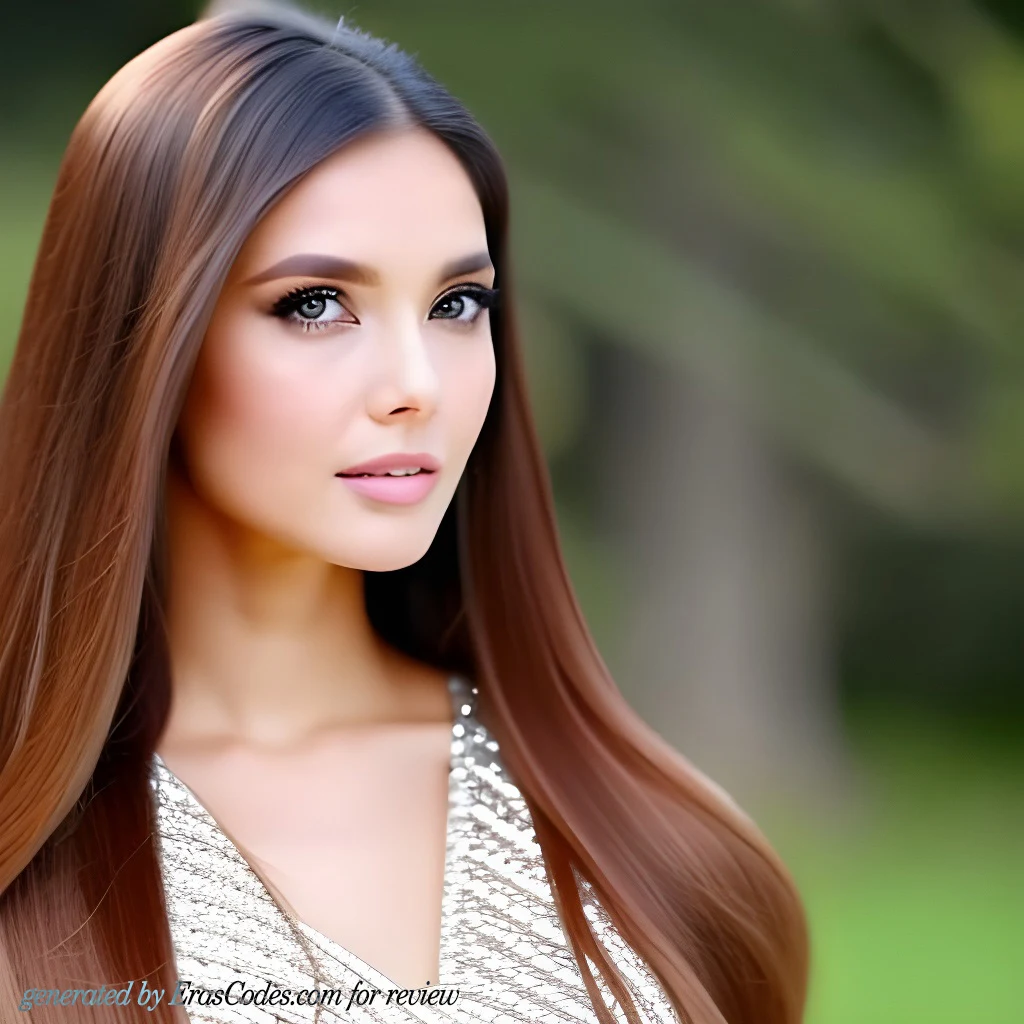

2. DALL-E 2

1. First Impression
DALL-E 2 interface is very simple. You can generate an art within a few seconds. Enter your text describing you want, and then click the Generate button to start the generation. In addition, you can use the AI powered DALL-E 2 to edit an image.
2. DALL-E 2 Account
In DALL-E 2, you need to login or sign up first. Only registered users have access to the image generation page.
3. Valuation System
DALL-E 2 comes with a credit system. They provide 50 credits for every new account with a one-month validity period.
4. Free vs. Paid
Each text-to-image generations with DALL-E-2 costs one credit. With this system, a new user can generate up to 50 creations within the first month. The default image generation resolution is 512px x 512px. Other than that, there is no an option or setting to set, before to start the AI image generation, even for paid users.
After the image generation, users can edit or enhance his creation by spending available credits.
5. Payment System and Price
If you need more credits, you can buy a 115 credits package for $15 with a 12 months validity period.
6. Copyrights
As per DALL-E 2 you, the creator, have full ownership of all creations, even for commercial use.
7. Platforms
DALL-E 2 is a web-based AI image generator, and still they haven’t published an Android, Apple, or PC version.
8. Samples
(click images to enlarge)  |
 |
 |

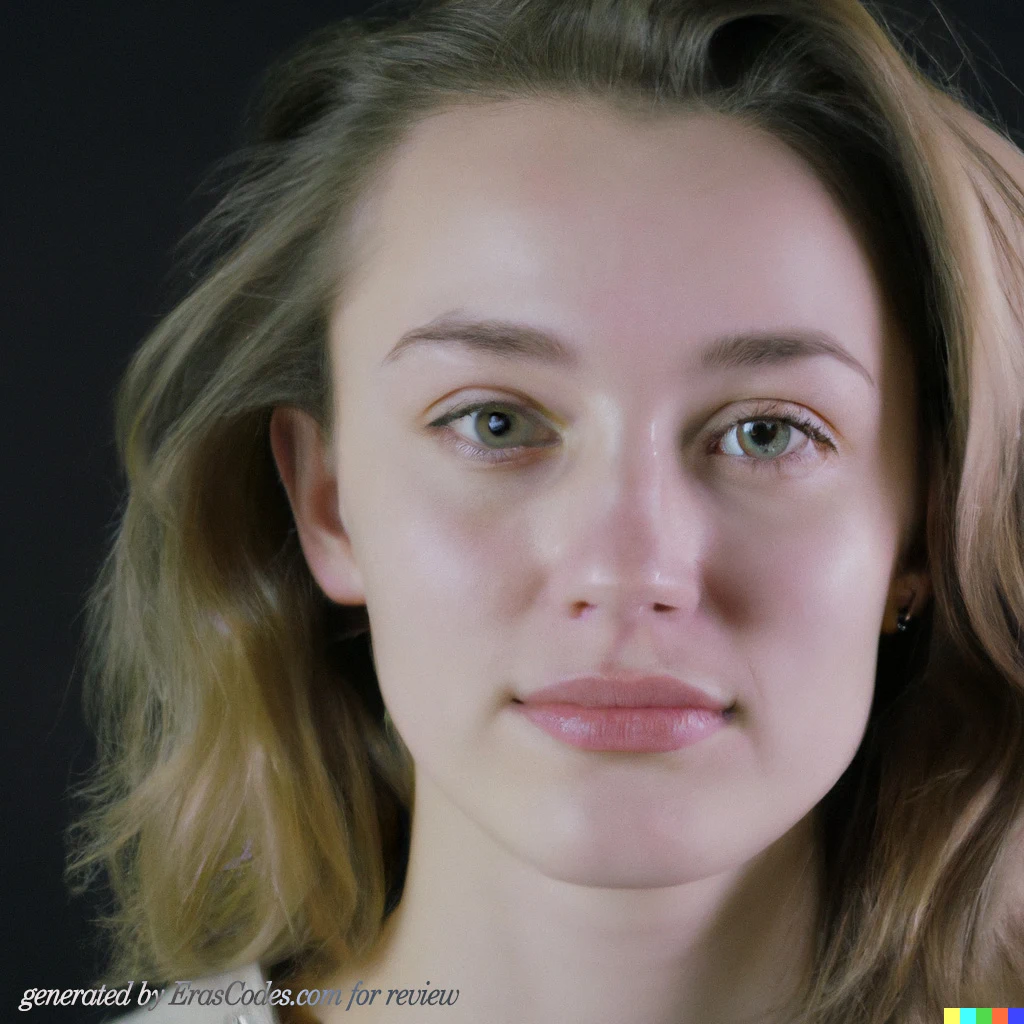

3. Starry AI

1. First Impression
You can start the text-to-image generation by clicking the "Start Creating" button in the middle of the web page or the "Create" button in the upper left corner. With Starry AI, you can't generate an image with a few clicks. After letting you select an AI for the image generation, they forward you to a page where you need to enter your text description. Finally, there are few other settings, you can adjust if you wish, or else you can start your AI image generation, which will take only a few seconds.
2. Starry AI Account
You can't use Starry AI without an account. They offer sign up through Google or Apple logins. Unfortunately, they don't offer signup via email.
3. Valuation System
Starry AI has a credit system. With the registration for a new account, you will receive 5 free credits to use with AI image generation process.
4. Free vs. Paid
Every image generation with Starry AI costs 1 credit. In addition to that, using higher runtimes can generate higher quality results, but it costs credits. Starry AI comes with five different canvas sizes, but free users can use only the portrait (4:5) size. The other four sizes will be available only to Starry AI Pro users.
5. Subscription
After the first free credit pack, every user will receive an additional 5 free credits on a daily basis, but you need to login to collect them. If you need more credits, you have two options. One-time purchase of 40 credits for 16 dollars onwards, or subscription program of 50 credits for $12 / month onwards, with many additional benefits.
6. Copyrights
As per Starry AI, you own the full rights to all your creations. You can use all your generated images for commercial and non-commercial purposes without any restriction.
7. Platforms
I tested and reviewed the web-based Starry AI. But Starry AI is available for both Android and Apple mobile devices as native apps.
8. Samples
(click images to enlarge)  |
 |
 |



4. Craiyon (Formerly DALL-E mini)

1. First Impression
Craiyon comes up with a very simple and easy interface, but it is full of advertisements all over the page. The text input area is in the middle of the page, and there are no settings or options before starting the image generation.
2. Craiyon Account
Craiyon does not require a sign up or login for image generation, but if you want to save your generated images with Craiyon, then you need to register first. But you can download the generated image to your computer without a Craiyon account. You can create an account using your email address or a Google login.
3. Valuation System
Craiyon has two types of accounts, free and paid. There is no point system or credit system.
4. Free vs. Paid
Features in Craiyon vary between free and paid packages as follows,
Free package,
- Every account has unlimited image generation.
- The shortest time it takes to generate an image is one minute.
- There are numerous advertisements on all pages.
- A small Cameron watermark appears on all generated images.
- Your all creations may be published in Craiyon without your knowledge or permission.
$5 per month package,
- The minimum time to a generation is 45 seconds.
- No advertisements.
- No watermarks.
- All images are private.
$20 per month package,
- The minimum time to a generation is 20 seconds.
- New features may be available for early access.
- All other advantages are the same as with the $5 monthly package.
5. Subscription
Subscription packages are very simple, $5/ month or $20/ month with the above mentioned features.
6. Copyrights
All images generated with free accounts contain a small Craiyon logo as a watermark. Removal of this logo is strictly prohibited, and you can use images for any purpose, including commercial purposes, but only with the watermark. If you need to remove the watermark, then you need to purchase a paid subscription.
7. Platforms
Craiyon is still only a web-based AI image generator.
8. Samples
(click images to enlarge)  |
 |
 |

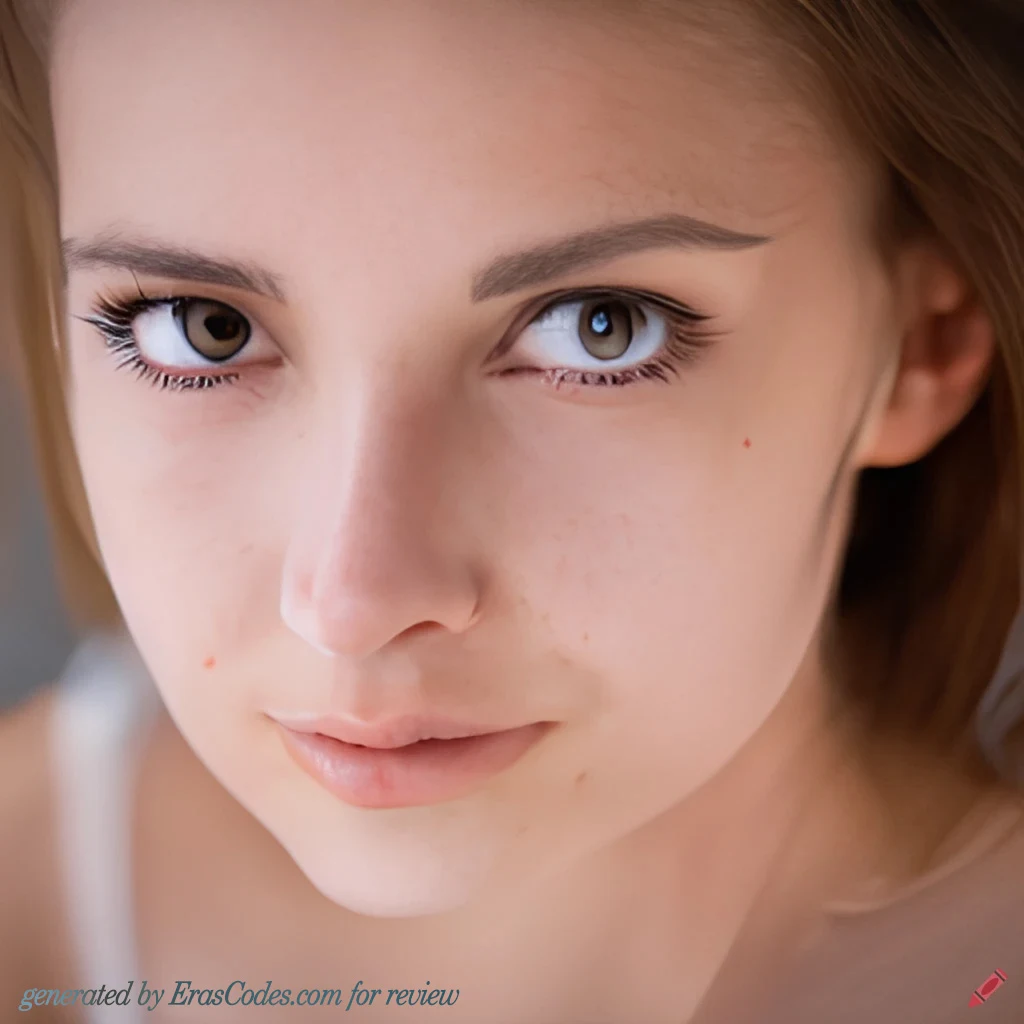

5. Midjourney
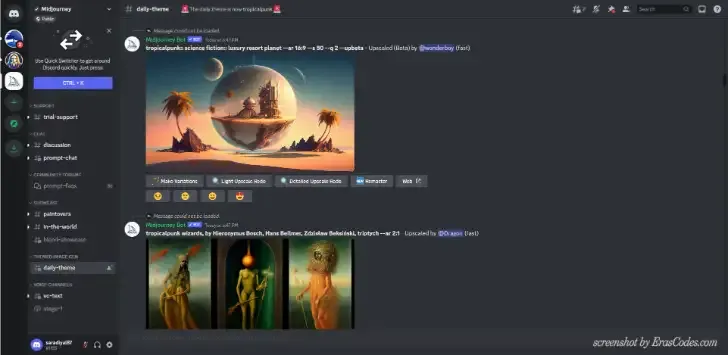
1. First Impression
Midjourney is a completely different AI image generator. They are using the Discord community platform to generate images. When you sign up for Midjourney, they will invite you to join their chat room in Discord. To generate an image with Midjourney AI, you need to send commands to the Midjourney bot via the chat. To generate an image, type "/" on the chat bar. Discord will recommend available commands to you. From that list, select "/imagine prompt" and type your text description for the image. The Midjourney bot will reply to your chat with generated images.
There are always a lot of people chatting with the Midjourney bot because this is a group chat, and a lot of text descriptions and replay images are passing between them. For a newbie to Discord, this situation is really confusing. Also, since this is only a chat, all settings should be included as text in the chat.
2. Midjourney Account
Since Midjourney runs through Discord, first you need to login to Discord to Midjourney AI image generator.
3. Valuation System
Midjourney counts the GPU time, which is basically the time it takes AI to generate an image.
4. Free vs. Paid
The free version of Midjourney is a trial version, and it allows users to generate around 24 images without any restriction. If you need to generate more, then you need to purchase a subscription plan. As a result, there is no difference in the resources available to free users versus paid users.
5. Subscription
Free users receive 24 minutes of GPU time that can generate approximately 24 images to test their service, features, and options. It’s a trial version, and at the end of the trial, you have no option other than to purchase a plan.
Paid subscriptions start at $10/ month. For $10, a user will receive 3.3 hours of GPU time per month, which is enough to generate approximately 200 images.
6. Copyrights
Free users are authorize to copy and distribute their creations, but not for commercial use. For commercial use, the image should be generated using a paid plan.
7. Platforms
Midjourney AI is accessible on all platforms because the Discord app is available on all of them: Windows, iOS, Android, Linux, and Mac.
8. Samples
(click images to enlarge)  |
 |
 |



6. Deep Dream Generator

1. First Impression
The first page features a wall of published images created with Deep Dream Generator. You can view the prompts of them, including all settings, and they facilitate importing that data to a new image generation window to generate your own new image.
In addition to text-to-image generation, Deep Dream Generator has another feature named Deep Style. This amazing feature allows users to embed a style or pattern from one image into another.
2. An Account
You need to have a registered account to generate images with this AI. They allow you to sign up with your Google or Facebook logins, as well as your email.
3. Valuation System
Deep Dream Generator employs an energy system to determine the worth of AI image generation and their options. According to them, this system equalizes phone battery charging. Every new account gets 100 energy points at the beginning. This is something like a battery whose maximum charge value is 100.
4. Free vs. Paid
The lowest energy requirement to generate an image is 5. Since the initial top-up is 100, you can continuously create 20 images with default settings.
If you want to increase the quality of the image from normal to high, then the image generation will consume 15 of energy. Also, if you decide to enhance the image to 1 MP or 2 MP, it will consume 10 and 20 of energy, respectively.
5. Subscription
The initial energy level is 100. The account will charge 3 values per hour up to 100 for free accounts. You can boost this charging rate by publishing your creations and receiving feedback. For example, if you can publish 40 images and receive 1000 likes, your recharge rate will increase to 8 per hour.
Their subscription program begins at $19/ month and will increase your battery level to 120 as well as your recharge rate to 12 per hour. In addition to that one time purchase, energy packages are also available.
6. Copyrights
You own your creation only if you have paid for them, either through a subscription or a one-time purchase. Otherwise, you can't use any image for commercial purposes.
7. Platforms
Deep Dream Generator AI is available only on the web.
8. Samples
(click images to enlarge)  |
 |
 |



7. Deep AI

1. First Impression
At the moment, Deep AI is offering four services. AI Image Generator, AI Image Editor, AI Text Generator, and AI Colorize Photos. From them, I tested only the AI Image Generator. First of all, it is full of advertisements on all four sides. Three of them had close buttons, and I closed them before taking the screenshot.
Deep AI is only one page. When you request to generate an image after entering text, the image will generate itself on the same page.
2. Deep AI Account
Deep AI does not require a login or signup to generate images. Also, there is no extra advantage, whether you registered or not.
Generated images are not being stored by Deep AI or saved to your account. If you want your generated image, then you need to download it to your local storage.
3. Valuation System
There is no special valuation system in Deep AI. They offer a simple monthly subscription program.
4. Free vs. Paid
Deep AI is almost free for unlimited AI image generation.
- 5 different aspect ratios (all available for free).
- Enhancement of the generated image to a higher resolution.
- 10 different styles.
- AI generated images may be published by Deep AI without your knowledge.
Paid users of Deep AI receive the following benefits,
- 16 premium styles will be available.
- No advertisements.
- All generated images are private.
5. Subscription
$5 per month and maximum 500 images. Whatever reaches you first, you need to pay again.
6. Copyrights
All generated contents are free to use for any purpose.
7. Platforms
Deep AI is only a web-based AI image generator.
8. Samples
(click images to enlarge)  |
 |
 |
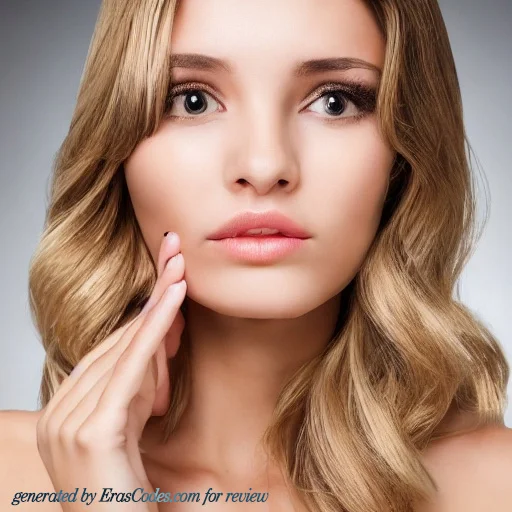


8. Dream by WOMBO (Dream AI)

1. First Impression
Dream by WOMBO looks like it was designed only for mobile phones because it generates only portrait images. Also, the maximum text description length is limited to 200 characters. Generated images can be edited using another prompt.
2. Dream by WOMBO Account
Anonymous users can generate unlimited images with Dream by WOMBO AI.
3. Valuation System
Dream by WOMBO doesn't offer any special valuation system. They offer a simple monthly subscription program.
4. Free vs. Paid
Free or anonymous users are allowed to generate unlimited images with Dream by WOMBO. In addition to that,
- At the moment, there are 55 styles available for free.
- Only one image will be generated as the result.
- Generated images are free to download.
For paid user,
- There are additional 13 premium styles available.
- Every generation will create four variants.
- Paid users will receive extra features via Discord.
5. Subscription
Packages are available for $9.99/month, $7.5/ month when paid annually, or $169.99 for a lifetime.
6. Copyrights
For generated art works, the user receives all related copyrights and other intellectual property rights.
7. Platforms
In addition to the web interface, Dream by WOMBO AI is also available on the Android and Apple platforms.
8. Samples
(click images to enlarge)  |
 |
 |
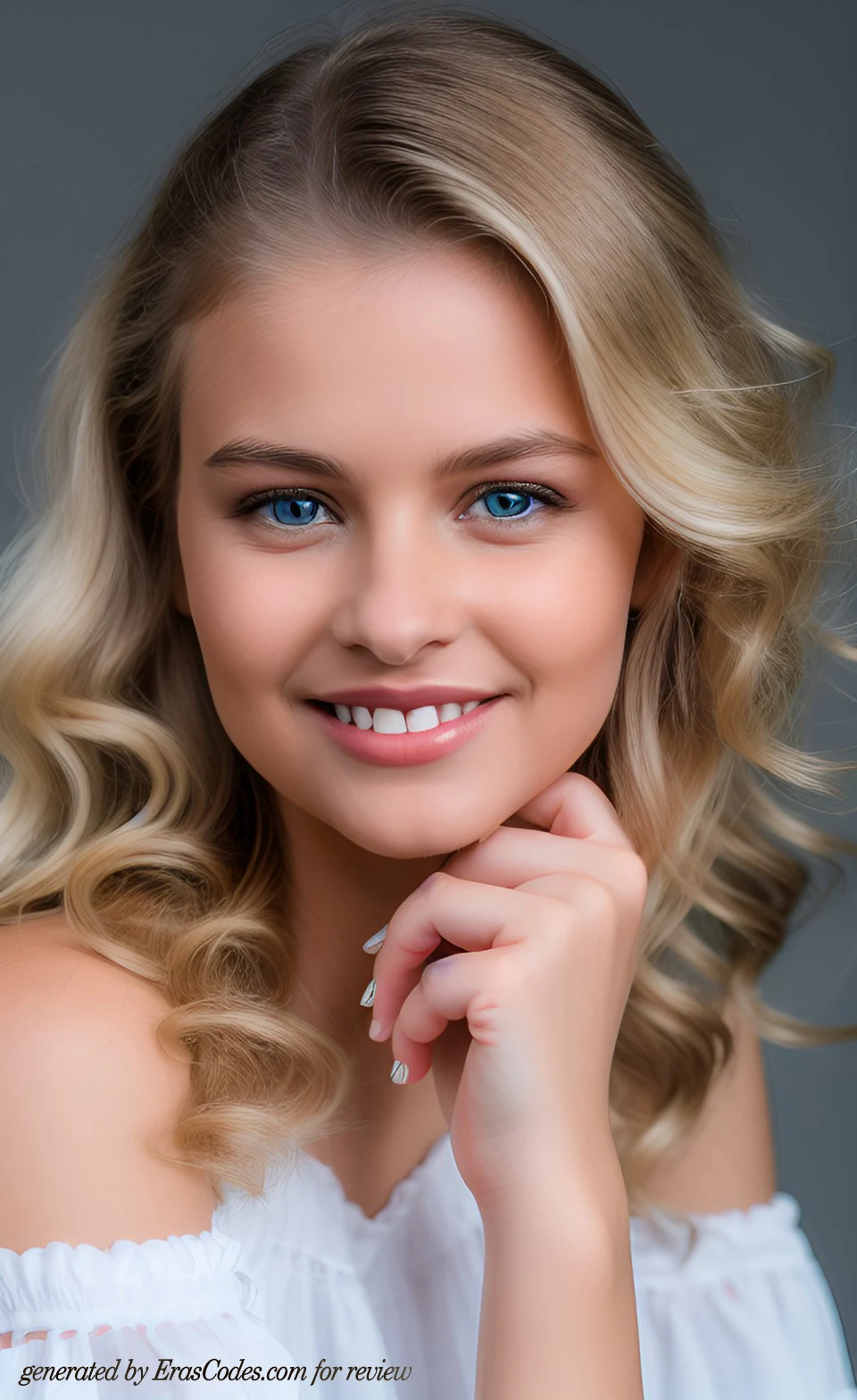


9. DreamStudio.ai

1. First Impression
DreamStudio is an AI image generator with a simple interface and many more settings to customize the result. However, because the background is black and the texts are dark gray, some text in the setting area is difficult to read.
2. DreamStudio Account
Dreamstudio requires you to sign in with an account, which you can create using your Google, Discord, or an email.
3. Valuation System
DreamStudio uses a credit system to evaluate their service, and every new user gets 100 credits for free at registration.
4. Free vs. Paid
With the credit system they have, there is no difference between free and paid. Every AI image generation has a cost that will be deducted from the credit balance. With minimal settings, an AI image generation will cost 0.2 credits, which means, with free credits, a user can generate up to 500 images.
5. Subscription
DreamStudio has a pay as you go payment plan, and you can buy 1000 credits for $10, which generates 5000 images with minimal settings.
6. Copyrights
You own the images you create with DreamStudio.
7. Platforms
At the moment, DreamStudio is available only on the web.
8. Samples
(click images to enlarge)  |
 |
 |



10. Photosonic

1. First Impression
A clean and simple interface. Users can choose from a list of image types to generate a painting, fantasy, anime, 3D, or any other. Also, users can generate images in three different sizes.
Photosonic's first page exhibits their best image and latest image generations. By clicking on those images, any user can copy their prompt to the text input area.
2. Photosonic Account
You must have an account with Photosonic in order to use their service. They allow you to sign up for this using your Google profile or an email address.
3. Valuation System
Photosonic has a credit system that costs 1 credit to generate an image, and it includes enhancement of the generated image to a higher resolution without extra cost.
All new account registrations offer 10 free credits, so users can generate 10 free images to test Photosonic's features, options, and capabilities.
4. Free vs. Paid
All free generated images are watermarked with the Photosonic logo, and paid users can generate watermarked free images. In addition to that, there is not much difference between free and paid. However, according to Photosonic, paid users will have access to beta versions.
5. Subscription
You can purchase 100 credits for $10 per month or unlimited credits for $25 per month.
6. Copyrights
Photosonic passes the copyright ownership terms to the "stability.ai" webpage via a link, and at the moment that link is not working. Then I tried to find any information from the stability.ai "Terms and Use" page, but unfortunately I couldn't find anything from them.
7. Platforms
Photosonic is currently a web-based application, and they haven't published it for other platforms yet.
8. Samples
(click images to enlarge)  |
 |
 |

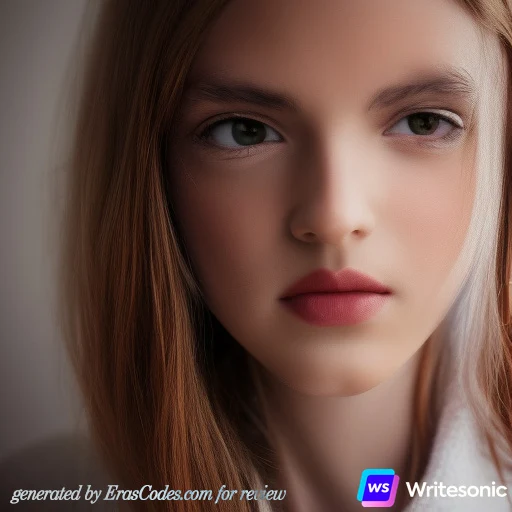

More Reviews (11 – 50)
We are dedicated to providing you with the most comprehensive and up-to-date information on AI image generators. As we continue to explore and evaluate the ever-expanding landscape of these powerful tools, we are excited to announce that we have plans to add more reviews in the near future. By subscribing to our blog, you will stay informed about the latest advancements, emerging platforms, and cutting-edge features of AI image generators. Don't miss out on the opportunity to make informed decisions and discover the perfect AI image generator for your needs. Subscribe today and be the first to receive our future reviews!
Final Thoughts
In this review, we have explored the top AI image generators available in 2023 and assessed their features, options, capabilities, and weaknesses. The world of AI-powered image processing has witnessed tremendous advancements, particularly in the realm of text-to-image generation. These AI image generators have the ability to create impressive and futuristic visuals based on text descriptions alone, captivating web users who crave unique and creative digital creations.
The blog post covered various features offered by AI image generators, including text-to-image generation, image enhancement, background removal, colorization of black and white images, and transforming real images into cartoons, among others. These commercial-level AI applications offer a wide range of possibilities for graphic designers, art designers, and individuals who frequently search for images or work extensively with visual content.
To determine the most suitable AI image generator, it is essential to thoroughly review and compare the available services. The review focused primarily on text-to-image AI generators and evaluated each platform based on several factors. These factors included the interface and customization options, the need for account registration, the valuation system (credit system or USD), the availability of features for free and paid users, subscription packages and costs, copyright and ownership of generated images, and platform compatibility.
To provide a comprehensive evaluation, the review included three prompts that were entered into each AI image generator. The first prompt consisted of specific and strict details to test the generators' performance in areas such as the generation of human hands, fingers, eyes, and teeth. The second prompt offered more freedom for the AI to showcase its capabilities, while the third prompt tested the generators' ability to work with landscape views.
While the prompts may not have been perfect for a flawless comparison, the generated images helped provide a better understanding of each AI image generator's capabilities. It is important to note that certain generators may excel in one area while exhibiting weaknesses in others, highlighting the need for careful consideration when selecting the most suitable option.
In conclusion, AI image generators have revolutionized image processing, enabling the creation of stunning visuals and expanding the possibilities of digital art. The availability of advanced features, options, and capabilities through these platforms offers tremendous potential for various industries and individuals seeking innovative and efficient solutions for their visual content needs. By exploring and comparing the top AI image generators in 2023, users can make informed decisions and leverage the power of AI to bring their creative visions to life.
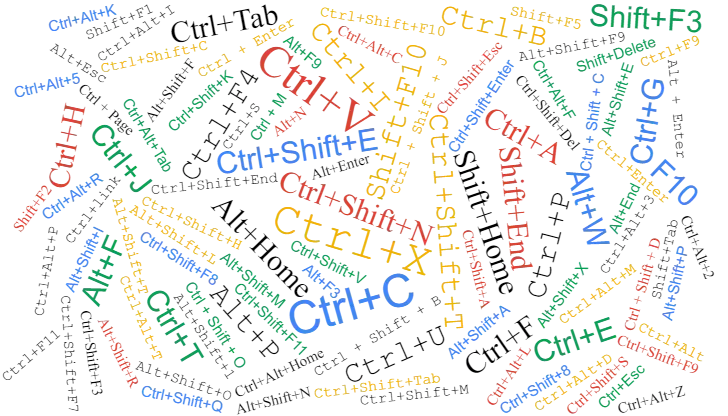
What are Computer Keyboard Shortcut Keys and why are they Important?
Are you looking for ways to become more efficient with your computer? Utilizing Computer Keyboard Shortcut keys might be the easiest and greatest way to speed up your workflow. By learning to use the most basic, important, and commonly used keyboard shortcut keys, you can save time and boost your efficiency very easily.
Keyboard shortcut keys are combinations of two or more keyboard keys pressed simultaneously to execute a command, access a menu, or perform a task. They are useful because they allow you to perform actions quickly without the need for a mouse or a touchpad. And also, if you are typing, you can perform the task without having to take your hands off the keyboard.
Windows has many built-in keyboard shortcut keys to help you work faster and get things done. But like many things in Windows, these keyboard shortcut keys are either ignored or never used because most users don't even know they exist.
The good news is that keyboard shortcut keys are not as hard to learn as you might think. You don’t need to be a computer whiz to start using them. With a few simple steps, you can be a keyboard shortcut master and make your life easier.
Just as a start, the three most commonly used keyboard shortcut keys are also the easiest to learn: Cut (Ctrl + X), Copy (Ctrl + C), and Paste (Ctrl + V). All of these keys are located next to each other on the keyboard, making them the easiest to access.
Also, the most basic keyboard shortcut keys are universal. As a result, almost all computer applications use the same keyboard shortcuts for the same function to make things easier for users. Once you've mastered them, you'll be able to use them in all of your computer applications, increasing your efficiency and reaping the benefits of being a keyboard shortcut master in all of them.
Even if you’re new to computers, you can quickly get up to speed by taking a few minutes to learn the basics. Before long, you’ll be navigating your computer with ease!
In this article, I will first introduce to you some of the most common and basic keyboard shortcut keys and explain how and where to use them to improve your efficiency. Also, I added more advanced keyboard shortcuts to the end of this basic list for those working on a large project with multiple applications or windows open at once.
In addition to the most common and basic keyboard shortcuts, different software developers have added unique keyboard shortcuts and further improved keyboard shortcuts to their applications. If you are a depth diver in any of the following computer applications, it will help you a lot.
Finally, I will introduce to you a few revolutionary tips and tricks on how to create your own simple, customized computer keyboard shortcuts to perform a simple task. And also, using macros, you can perform very complex and serious tasks using a single keyboard shortcut.
So, if you want to save time, increase your efficiency and productivity, and take control of your computer, this article is for you. Join me to explore the power of the computer keyboard shortcuts.
Most Used Keyboard Shortcut Keys You Need to Know
Basic Keyboard Shortcut Keys - Windows XP, 7, 8, 10, and 11
| Key Combination | Description |
|---|---|
| Ctrl + C | Copy. Copy the selected item. Files, folders, text parts, or any other copyable item. |
| Ctrl + V | Paste. Paste copied items as much as you want or cut items once. |
| Ctrl + X | Cut. Cut the selected item. Move Files, folders, text parts, or any other copyable items with Paste command. |
| Ctrl + A | Select all items. Files, Folders, text or any other selectable items. |
| Ctrl + Z | Undo the last action. Windows explorer allow only one undo and most of other application allows multiple undoes. |
| Ctrl + Y | Redo the last undo action. |
| Alt + F4 | Close the active Window or application. |
| Ctrl + F4 | Close the active document or windows (in applications that let you to work in multiple documents at the same time). |
| Alt + Esc | Switch between open applications (desktop not included). |
| Alt + Tab | Open a active window switching menu and switch immediately (desktop included). |
| Ctrl + Alt + Tab | Open a active window switching menu and switch with Enter (desktop included). |
| Windows Key + Tab | Task View. Allow switching between active windows (desktop included). |
| Ctrl + Shift + Esc | Open Windows Task Manager. |
| Alt + D | Select the address bar in Windows Explorer. |
| Alt + E | Open Edit menu in Windows explorer and many other applications. |
| Alt + Enter | Open Properties for the selected item (file, folder, shortcut, etc.). |
| Alt + F | Open File menu in Windows explorer and many other applications. |
| Alt + P | Display the preview panel. |
| Alt + Left arrow | Go back or view the previous folder. |
| Alt + Right arrow | Go forward or view the next folder. |
| Alt + Up arrow | View the folder that the folder was in. |
| Alt + Page Down | Move down one screen. |
| Alt + Page Up | Move up one screen. |
| Alt + Spacebar | Open the shortcut menu for the active window. |
| Ctrl + F | Open the find/ search menu of current windows, app, or web page. |
| Ctrl + scroll mouse wheel | Change the size of file and folder icons. |
| Ctrl + N | Open a copy of same window in Winows Explorer, blank document in many applications, new tab in web browsers. |
| Ctrl + O | Open a file in the current application. |
| Ctrl + P | Print the current page or document. |
| Ctrl + Shift + N | Create a new folder. |
| Home | Go to the first item or beginning of the text line. |
| End | Go to the last item of end of the text line. |
| F1 | Open Help and support window. |
| F2 | Rename a selected file or folder. |
| F3 | Search for a file or folder in File Explorer. |
| F4 | Display latest visited addresses in File Explorer. |
| F5 | Refresh the active window. |
| F10 | Activate/ Show the Menu bar in the active application. |
| F11 | Open and close Full Screen of active window. |
| Shift + Delete | Delete the selected item without moving to the Recycle Bin. |
| Shift + F10 | Display the shortcut menu for the selected item. |
| Windows Key + Down arrow | Minimize the active window. |
| Windows Key + Up arrow | Maximize the active window. |
| Windows key + D | Hide and Display the desktop. |
| Windows Key + L | Lock the computer or switch account (password required to access again). |
| Windows Key + E | Open File Explorer. |
| Windows Key + F | Find in Windows System. |
| Windows Key + + (Plus) | Open Magnifier and zoom in. |
| Windows Key + - (Plus) | Zoom out in magnifier. |
| Windows Key + Esc | Exit from magnifier. |
| Windows Key + Home | Minimize all except the active window or app (restores all windows on second stroke). |
| Windows Key + M | Minimize all windows. |
| Windows Key + Shift + M | Restore minimized windows by above command. |
| Windows Key + Down arrow | Minimize active window. |
| Windows Key + Up arrow | Maximize the active window. |
| Windows Key + Left arrow | Shift active window to the left side of the screen. |
| Windows Key + Right arrow | Shift active window to the right side of the screen. |
| Windows Key + number | Open pinned apps in the taskbar. The number indicates the position of the app in Taskbar. |
| Windows Key + P | Choose a presentation display mode. |
| Windows Key + R | Open the Run dialog box. |
| Windows Key + Shift + Down arrow | Restore/minimize active windows, maintaining the vertically width. |
| Windows Key + Shift + Up arrow | Stretch the active window to the top and bottom of the screen. |
| Windows Key + U | Launch Ease of Access Center. |
| Windows Key + X | Open the Quick Link menu. |
Basic Keyboard Shortcuts for Text Formatting
Text formatting is an important part of creating professional documents, as it helps to make them easier to read and understand. Text formatting can include changes to the font, size, color, alignment, line spacing, and indentation of a text. As text formatting should be performed at the same time as text typing using the keyboard, keyboard shortcuts for text formatting can add priceless value to efficiency improvement because the user can perform the text formatting without taking off the keyboard. Common keyboard shortcuts used for text formatting are as follows,
| Key Combination | Description |
|---|---|
| Ctrl + A | Select all. |
| Ctrl + B | Apply bold formatting to text. |
| Ctrl + I | Apply italic formatting to text. |
| Ctrl + U | Apply underline formatting to text. |
| Ctrl + O | Open a document. |
| Ctrl + N | Create a new document. |
| Ctrl + S | Save the document. |
| Ctrl + W | Close the document. |
| Ctrl + C | Copy the selected content to the Clipboard. |
| Ctrl + V | Paste the contents of the Clipboard. |
| Ctrl + X | Cut the selected content to the Clipboard. |
| Ctrl + Z | Undo the previous action. |
| Ctrl + Y | Redo the previous action, if possible. |
| Ctrl + P | Go to Print Window. |
Keyboard Shortcuts for Web Browsers
Web browsers are one of the most widely and frequently used application types on computers. They are used to access websites, view webpages, and search the internet. Keyboard shortcuts are a great way to speed up your web browsing experience and make it more efficient. Many web browsers, such as Google Chrome, Firefox, and Safari, offer the same keyboard shortcuts to perform the same tasks. The keyboard shortcuts listed below are the most useful among common keyboard shortcuts for web browsers.
| Key Combination | Description |
|---|---|
| F5 | Refresh/ Reload the web page. |
| Ctrl + F5 | Refresh/ Reload the web page with resetting the browser cache. |
| Esc (at loading a page) | Stop loading the web page. |
| Ctrl + T | Open a new tab. |
| Ctrl + F4 , Crtl + W | Close the current tab. |
| Ctrl + Shift + T | Undo Close Tab. |
| Ctrl + N | Opens a new window. |
| Alt + F4 | Close window with all tabs. |
| Ctrl + Tab | Cycle forward to the next tab when multiples tabs available. |
| Ctrl + Shift + Tab | Cycle backward to the previous tab. |
| Ctrl + (1 to 8 number) | View Tab 1 to 8. |
| Ctrl + 9 | View Last Tab. |
| Ctrl + Page Up | View Left Tab. |
| Ctrl + Page Down | View Right Tab. |
| Ctrl + Shift + Page Up | Move current Tab to Left. |
| Ctrl + Shift + Page Down | Move current Tab to Right. |
| Mouse wheel Press | Close the tab if clicked on a tab, opens links in a new tab, scroll. |
| Ctrl + link click | Open link in a new tab. |
| Shift + link click | Open link in a new window. |
| Shift + Ctrl + link click | Open link in a new background tab. |
| Ctrl + P | Print. |
| Ctrl + E , Ctrl + K | Select the search box or omnibar for a web search. |
| Ctrl + M | Mute/ Unmute Audio. |
| Alt + F | Makes the Menu bar visible (if hidden). |
| F11 | Fullscreen mode On and Off. |
| Alt + Home | Load Homepage. |
| Backspace , Alt + Left Arrow | Back to previous web page. |
| Shift + Backspace , Alt + Right Arrow | Forward after a back. |
| Home | Scroll to the top of the page. |
| End | Scroll to the bottom of the page. |
| Spacebar , Page Down | Scroll down, Play and Pause video or audio. |
| Shift+ Spacebar , Page Up | Scroll up. |
| Ctrl + C | Copy selected item. |
| Ctrl + X | Cut (copy and delete original at paste) selected item. |
| Ctrl + V | Paste copied item. |
| Ctrl + D | Bookmark current page. |
| Ctrl + Shift + D | Bookmark All Tabs. |
| Ctrl + Shift + B | Show/hide the Bookmarks toolbar. |
| Ctrl + Shift + O | Show All Bookmarks (Library Window). |
| Ctrl + O | Open a local file in the browser. |
| Ctrl + S | Save as the current page. |
| Ctrl + H | Open browsing history. |
| Ctrl + Shift + Del | Opens up the clear browser history dialog or settings. |
| Ctrl + J | Open Downloads. |
| F3 , Crtl + F | Perform a text search on the current page, find next text result. |
| Shift + F3 , Ctrl + Shift + G | Find previous text search results. |
| Ctrl + G | Find next text result. |
| Ctrl + Mouse Wheel | Zoom in or out. |
| Ctrl + 0 | Reset Zoom to 100% (default). |
| F6 , Alt + D , Ctrl + L | Select/ focus the address bar. |
| Alt + Shift + Enter | Open Address or Search in New Background Tab. |
| Alt + Enter | Open Address or Search in New Foreground Tab. |
| Shift + Enter | Open Address or Search in New Window. |
| Ctrl + Enter | Open Search in New Background Tab. |
| Ctrl + Shift + Enter | Open Search in New Foreground Tab. |
| F12 | Open developer tools or Firebug. |
| Ctrl + Shift + C | Inspector. |
| Ctrl + Shift + J | Browser Console. |
| Ctrl + U | View source. |
| Shift + Del | Delete Selected Autocomplete Entry. |
| F7 | Caret Browsing. |
How to Create Your Own Keyboard Shortcuts
Mainly, you can create your own keyboard shortcuts for two purposes. The first one is simply to open an existing application. The second is to perform any other complex task.
At the first point, I divide custom keyboard shortcuts into two variants because there are two ways to create your own custom keyboard shortcuts in Windows. The first method is very simple, and you can create your own keyboard shortcut to launch an existing application. But if you need to perform any other task in Windows using a keyboard shortcut, it is a little complex, and you need the assistance of a third-party application to do it.
How Create Your Own Keyboard Shortcut Key to Open an Existing Application
- Find the application on the desktop (desktop icon), in the taskbar as a pinned icon, or in the start menu.
- If the icon is in the Desktop or Start Menu, right-click and go to Properties. If the icon is pinned in the taskbar, press Shift + Right Click and select Properties.
- In the Properties window, go to the Shortcut Tab.
- In the Shortcut tab, assign any key to Shortcut Key.
- Your own keyboard shortcut to launch the application will be something like Ctrl + Alt +...
- Finally, click OK to confirm your changes.
After this, when you press Ctrl + Alt + the given key using your keyboard, the application will launch immediately.
How Create Your Own Keyboard Shortcut Key to Perform a Complex Task
Performing any task in Windows other than opening an existing application is a difficult task because we use the inbuilt Windows menu to create keyboard shortcuts to run existing applications and there is no inbuilt menu of functions to create a keyboard shortcut in Windows.
To create a keyboard shortcut for a complex task, we need the assistance of third-party apps. And the following are the best applications available to create new keyboard shortcuts in Windows.
WinHotKey
WinHotKey is a simple and small tool that allows users very easily to create new keyboard shortcuts for the following functions.
- Launch a program.
- Open a document.
- Open a folder.
- Minimize, maximize, or restore the current window.
- Start to resize or move the current window with the mouse.
WinHotKey is limited only to the above functions, and there is no other way to assign a keyboard shortcut to any other function or task. However, due to its simple design, ease of use, and free license, it has become an outstanding application.
AutoHotkey
AutoHotkey is not simple. Using programming scripts, it allows users to assign their own keyboard shortcuts to very complex tasks. If you are familiar with programming scripts, AutoHotkey is for you. However, even if you don't have any knowledge of scripts, they have provided full support documents to help you learn everything from the beginning. This application is also free software and comes with an open-source license.
Conclusion
Mastering computer keyboard shortcuts can greatly increase productivity and efficiency while using a computer. By utilizing keyboard shortcuts, you can perform tasks faster and with less strain on your hands. The keyboard shortcuts listed in this article are just a starting point and it's recommended to explore and learn the ones that are most relevant to your specific needs and tasks.
Especially if you are using a specific application for your tasks, like Adobe Photoshop, Illustrator, Autodesk AutoCAD, developers of those applications have integrated more keyboard functions to their applications to improve user's efficiency. By incorporating these into your workflow, you'll find that your daily computer usage becomes smoother and more efficient.
